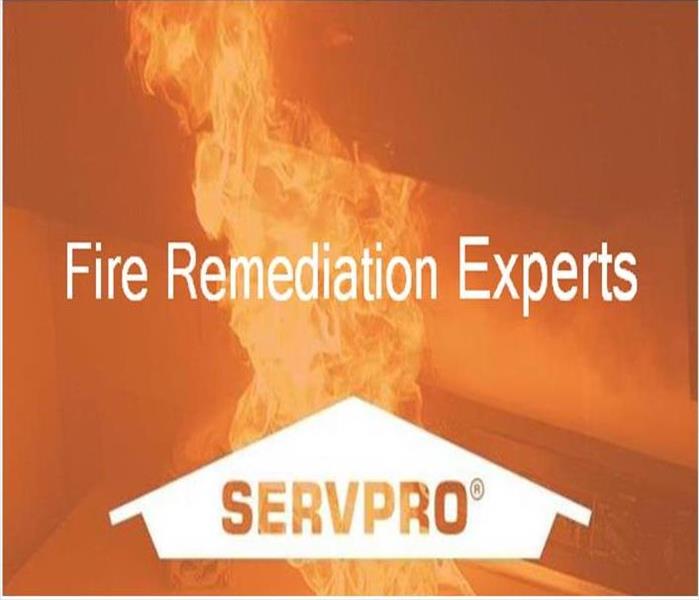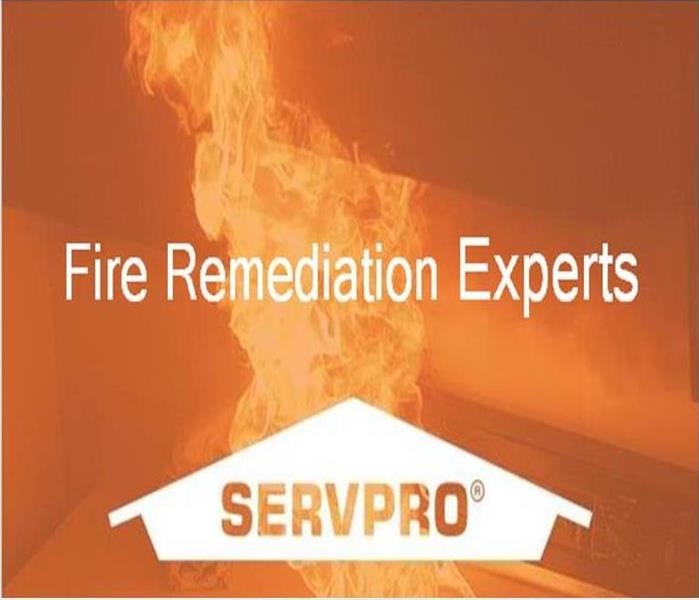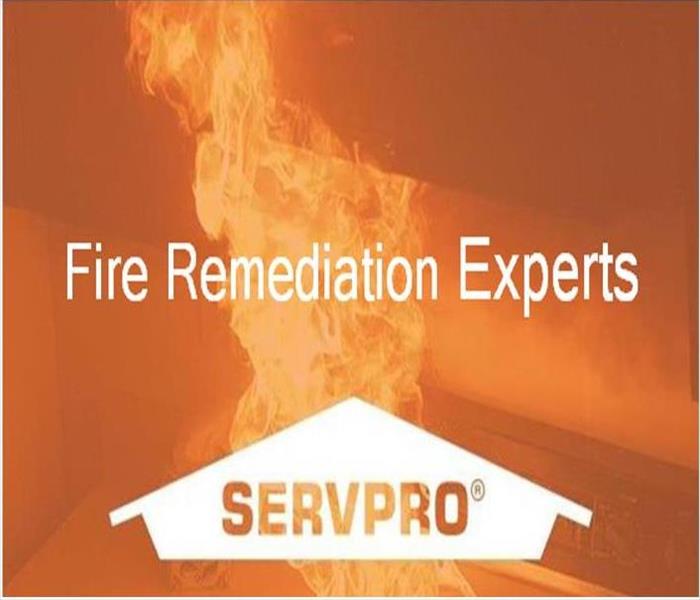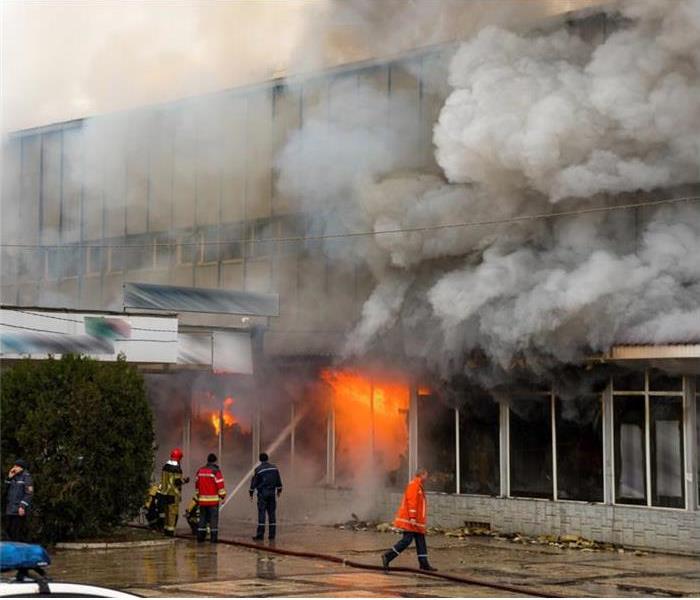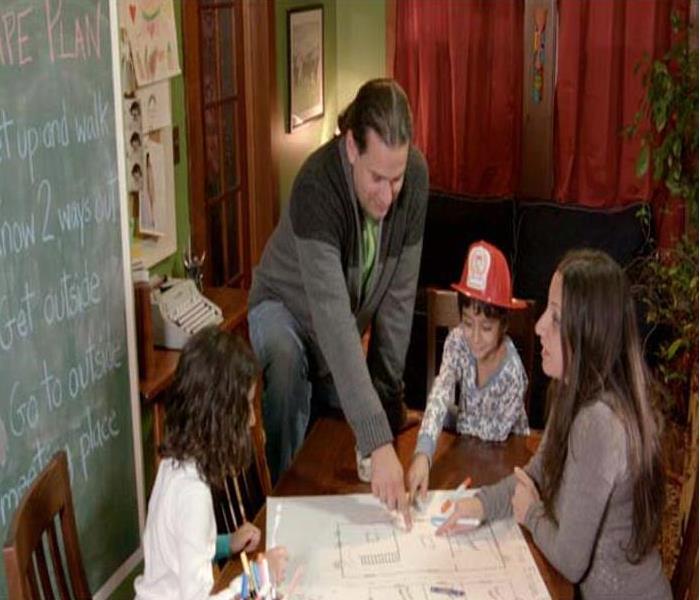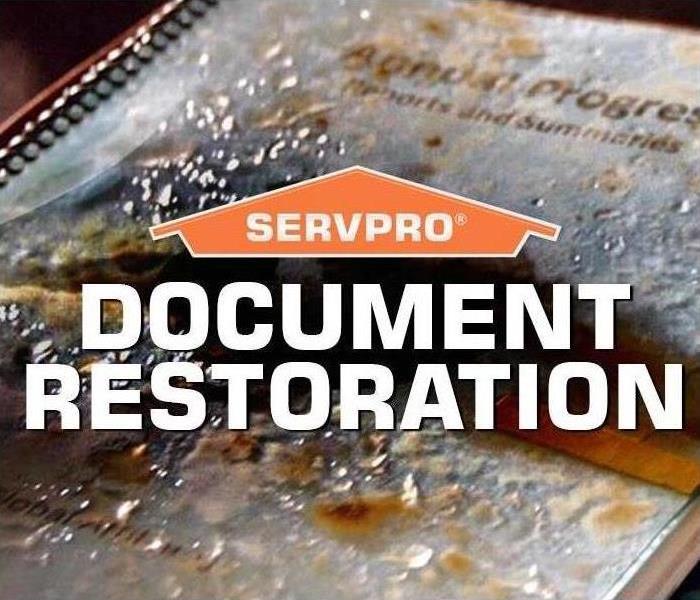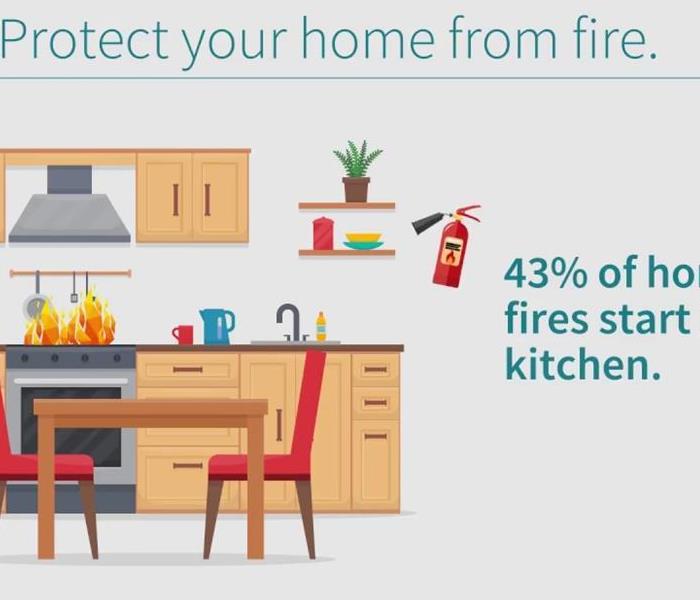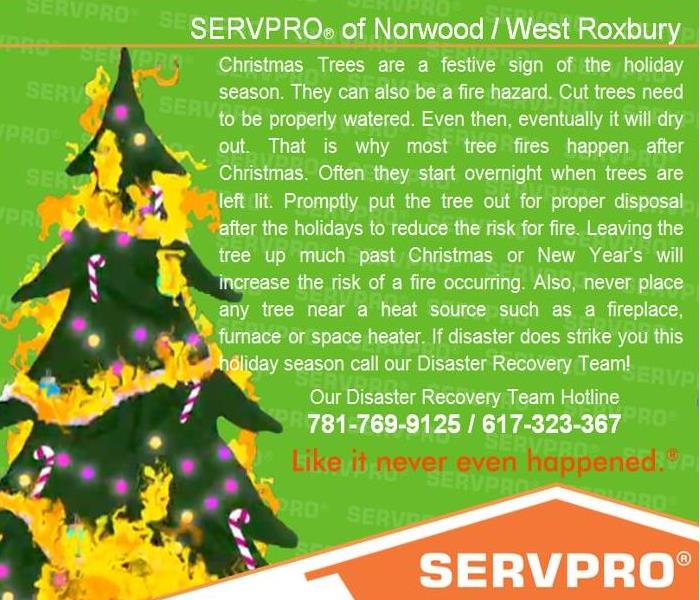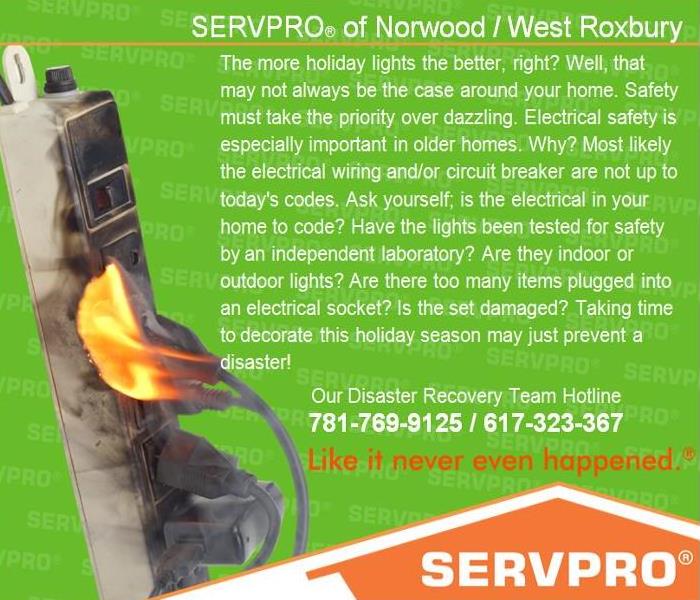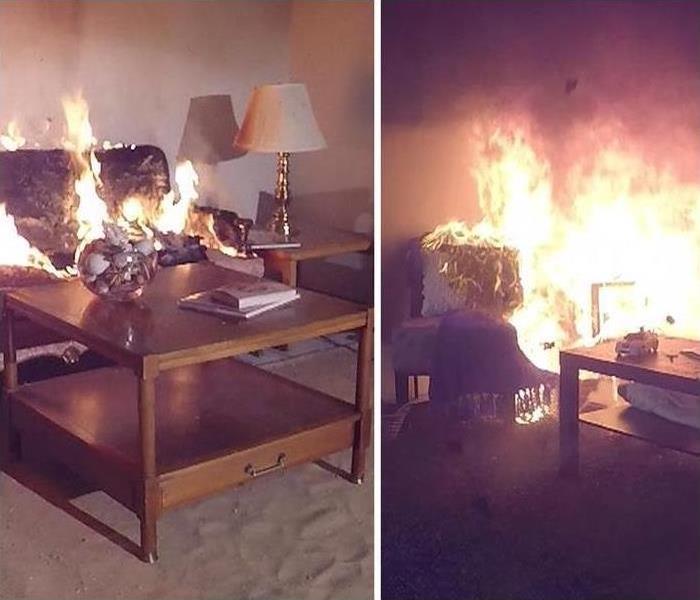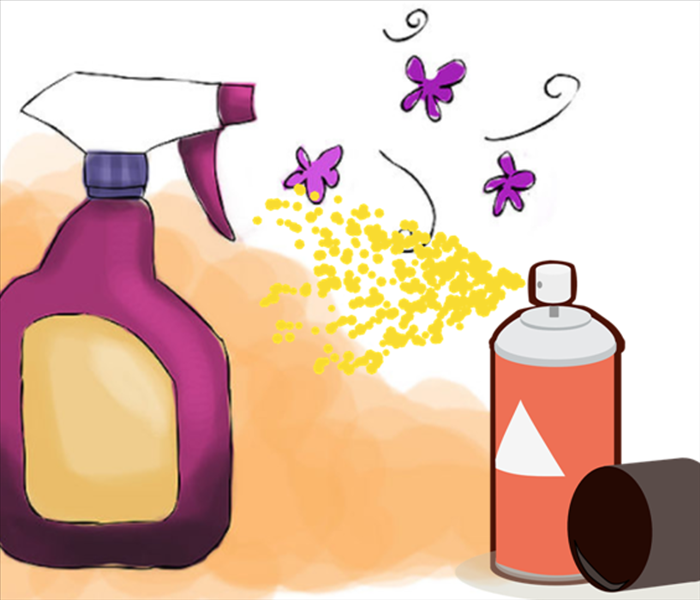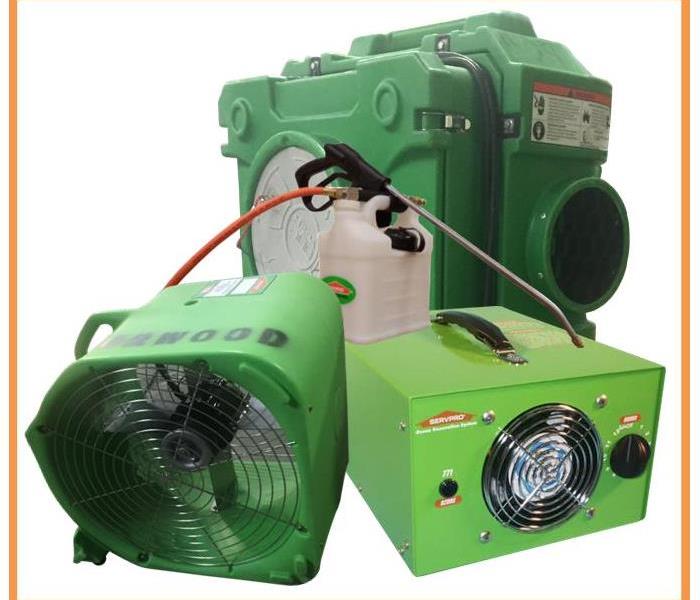Recent Fire Damage Posts
Essential Fire Prevention Tips for Homes and Businesses
2/20/2025 (Permalink)
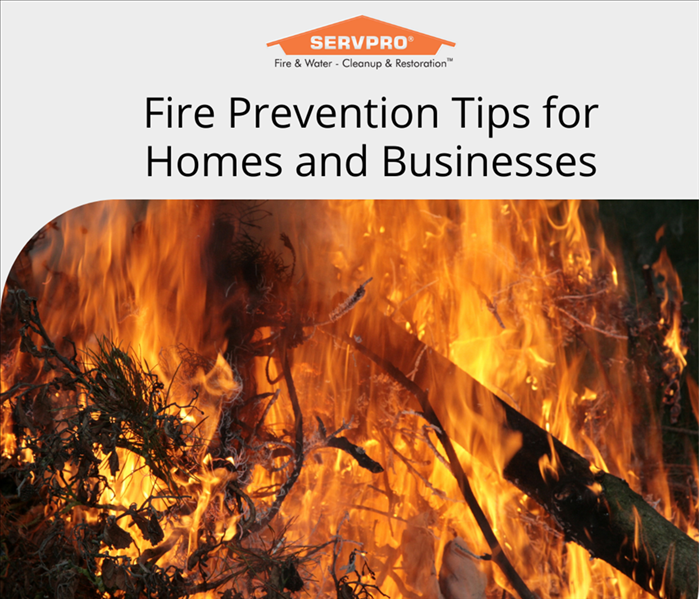 Preventing fires not only protects your property but also ensures the safety of your family, employees, and customers.
Preventing fires not only protects your property but also ensures the safety of your family, employees, and customers.
Fire safety is a top priority for homeowners and business owners alike. Preventing fires not only protects your property but also ensures the safety of your family, employees, and customers. Understanding key fire prevention strategies can help minimize risks and keep your space secure.
1. Install and Maintain Smoke Alarms
Why It Matters:
Smoke alarms provide early detection, allowing you to react quickly and prevent fire-related tragedies.
For Homes:
- Install smoke alarms in every bedroom, outside sleeping areas, and on all levels of your home.
- Test alarms monthly and replace batteries annually.
- Replace smoke detectors every 10 years.
For Businesses:
- Position smoke alarms in high-risk areas such as kitchens, break rooms, and storage rooms.
- Ensure all fire detection systems are functional and meet safety regulations.
2. Practice Safe Cooking Habits
Why It Matters:
Cooking fires are one of the leading causes of home and business fire incidents.
- Never leave cooking food unattended.
- Keep flammable materials like towels, curtains, and paper away from stoves.
- Restaurants and businesses with kitchens should provide fire safety training for employees.
3. Use Electrical Systems Safely
Why It Matters:
Electrical malfunctions, faulty wiring, and overloaded circuits can easily ignite fires.
- Avoid overloading electrical outlets and power strips.
- Regularly inspect cords for damage and replace frayed or worn ones.
- Hire licensed electricians to inspect and repair electrical systems as needed.
4. Store Flammable Materials Properly
Why It Matters:
Flammable liquids and materials can ignite quickly if not handled with care.
- Store flammable substances in original containers and keep them away from heat sources.
- Businesses should follow OSHA guidelines for handling and storing hazardous materials.
5. Create and Practice a Fire Escape Plan
Why It Matters:
A well-planned fire escape strategy can mean the difference between safety and disaster.
For Homes:
- Develop an evacuation plan with two exits per room.
- Establish a designated outdoor meeting spot.
- Conduct fire drills with family members regularly.
For Businesses:
- Implement an emergency action plan with clear exit routes.
- Conduct regular fire drills to ensure employees are prepared.
- Post evacuation maps in visible locations.
6. Use Heating Equipment Safely
Why It Matters:
Improper use of heating equipment, space heaters, and fireplaces increases fire risks.
- Keep space heaters at least three feet away from flammable objects.
- Clean and inspect chimneys and fireplaces annually.
7. Install Fire Suppression Systems
Why It Matters:
Fire extinguishers and sprinkler systems can prevent small fires from spreading.
- Keep fire extinguishers easily accessible in key areas.
- Businesses should invest in automatic sprinkler systems for added protection.
Fire Damage Restoration and Recovery
Even with strong fire prevention measures, fires can still occur. Having a reliable fire damage restoration plan is crucial for quick recovery. Our expert team specializes in:
? Smoke and soot cleanup
? Odor removal
? Structural repairs
As a trusted leader in fire damage restoration, Norwood/West Roxbury provides professional services with advanced equipment and expert training. Protect your home and business with proactive fire safety measures today!
Fire Damage: Steps to Take Before Help Arrives
1/16/2025 (Permalink)
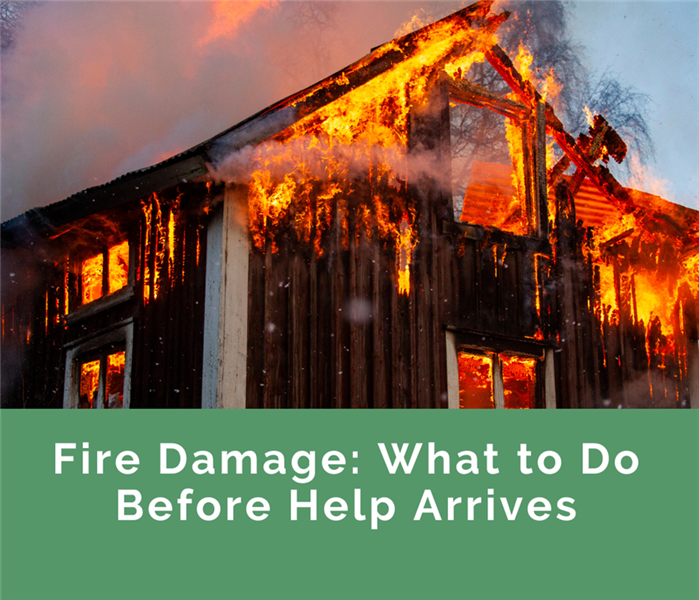 Follow this guide to manage fire damage safely until professional assistance arrives.
Follow this guide to manage fire damage safely until professional assistance arrives.
Experiencing a fire can be overwhelming, but taking the right actions immediately afterward can make a significant difference. Follow this guide to manage fire damage safely until professional assistance arrives.
1. Prioritize Safety
Your safety is the top priority. Do not re-enter the property until the fire department has confirmed it is safe. Fire-damaged buildings may have structural issues, lingering smoke, or electrical hazards that pose serious risks.
2. Document the Damage
When it’s safe, take detailed photos and videos of the damage. Proper documentation is essential for filing insurance claims and ensuring you receive appropriate compensation.
3. Avoid Cleaning on Your Own
Fire and smoke damage require professional cleaning techniques. Attempting to clean soot or smoke-damaged areas yourself can worsen the damage or spread contaminants. Leave the restoration process to trained experts.
4. Rely on Professional Restoration Services
When our team arrives, we’ll evaluate the damage, develop a detailed restoration plan, and start the process of cleaning, deodorizing, and repairing your property. Our expertise ensures effective restoration, even in cases of severe fire damage.
At Norwood/West Roxbury, we are a trusted leader in the restoration industry. With advanced training and specialized equipment, we’re ready to restore your home or business to its pre-fire condition.
Home Restoration 101: Recovering from Holiday Cooking Mishaps and Kitchen Fires
12/4/2024 (Permalink)
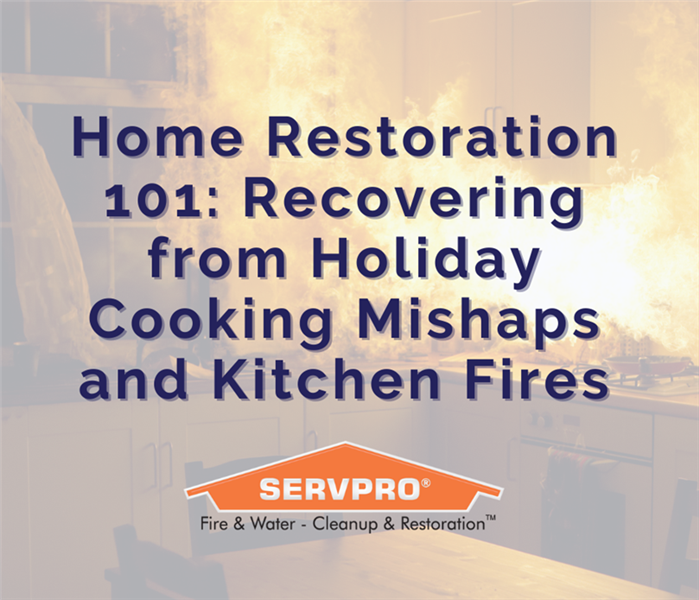 Need help restoring your kitchen after a fire?
As a trusted leader in restoration, SERVPRO of Norwood/West Roxbury has the expertise
Need help restoring your kitchen after a fire?
As a trusted leader in restoration, SERVPRO of Norwood/West Roxbury has the expertise
The holiday season is a time for family gatherings, festive meals, and, unfortunately, a rise in cooking-related fires. With the kitchen busier than usual, accidents can range from minor mishaps to significant kitchen fires. Knowing how to prevent and respond to these situations—and how to recover from any damage—can save you time, stress, and money. Here’s your guide to avoiding holiday cooking disasters and restoring your kitchen if the unexpected occurs.
How to Prevent Holiday Cooking Fires
Before discussing restoration, it’s essential to focus on fire prevention. Here are key steps to reduce the risk:
1. Stay Focused While Cooking
Distractions abound during the holidays, but never leave a hot stovetop or oven unattended. If you need to step away, turn off the heat temporarily.
2. Avoid Loose Clothing
Long sleeves or flowing fabrics can easily ignite. Wear snug clothing or roll up your sleeves to stay safe.
3. Keep Flammable Items Away
Ensure towels, paper towels, and wooden utensils are kept far from open flames or hot surfaces. A clutter-free workspace is safer.
4. Keep a Fire Extinguisher Nearby
Having a kitchen-rated fire extinguisher on hand can stop small fires before they spread. Ensure everyone in the home knows how to use it.
5. Use Caution with Oil and Grease
Grease fires are a common hazard. Keep an eye on hot oil, as it can overheat quickly. If a grease fire starts, never use water—it will spread the flames.
What to Do if a Cooking Fire Happens
Despite precautions, accidents can occur. Follow these immediate steps:
- Turn Off the Heat: Shut off the burner or oven to prevent the fire from spreading.
- Smother the Flames: Cover a small stovetop fire with a metal lid or baking sheet. Avoid using water, flour, or anything flammable.
- Use a Fire Extinguisher if Needed: If the fire grows beyond what you can manage, use an extinguisher and call emergency services.
- Ventilate Safely: Once the fire is out, open windows to clear smoke but avoid using your range hood until it’s inspected.
Recovering from Kitchen Fire or Smoke Damage
If a fire leaves damage in its wake, follow these steps to restore your kitchen:
1. Assess the Damage
Examine the affected areas to determine whether the damage is surface-level or requires deeper cleaning and repairs.
2. Clean Soot and Smoke Residue
- Soot: Use a vacuum with a brush attachment to lift loose soot without smearing.
- Smoke Residue: Clean surfaces with a mixture of water, vinegar, and mild detergent. Rinse thoroughly to remove any residue.
3. Eliminate Lingering Odors
- Ventilation: Open windows and run fans to circulate fresh air.
- Absorb Odors: Use baking soda on fabrics or activated charcoal to neutralize smells.
- Air Purifiers: HEPA filters can help remove airborne particles and odors.
4. Deep Clean Appliances
- Oven and Stovetop: Follow your appliance manual for proper cleaning techniques.
- Vent Hood: Remove and clean grease-laden filters, replacing them if needed.
5. Repair or Replace Damaged Areas
- Cabinets and Counters: Sand and repaint or replace as necessary.
- Flooring: Fire or water damage may require patching or replacing affected sections.
6. Call a Professional for Severe Damage
For extensive damage, professional restoration services can handle tough cleaning and repairs using specialized tools and techniques.
Preventing Future Cooking Mishaps
Keep your kitchen safe year-round by adopting these habits:
- Regularly clean your oven, stovetop, and vent hood to prevent grease buildup.
- Test smoke detectors monthly to ensure they’re functioning.
- Review fire safety procedures with your family so everyone knows what to do in an emergency.
Cooking fires are a common holiday hazard, but with careful precautions and a solid recovery plan, you can enjoy a safe and festive season.
Need help restoring your kitchen after a fire?
As a trusted leader in restoration, SERVPRO of Norwood/West Roxbury has the expertise and tools to get your home back to normal. Call us today for assistance.
Holiday Cooking Safety: Tips to Keep Your Kitchen Fire-Free
11/15/2024 (Permalink)
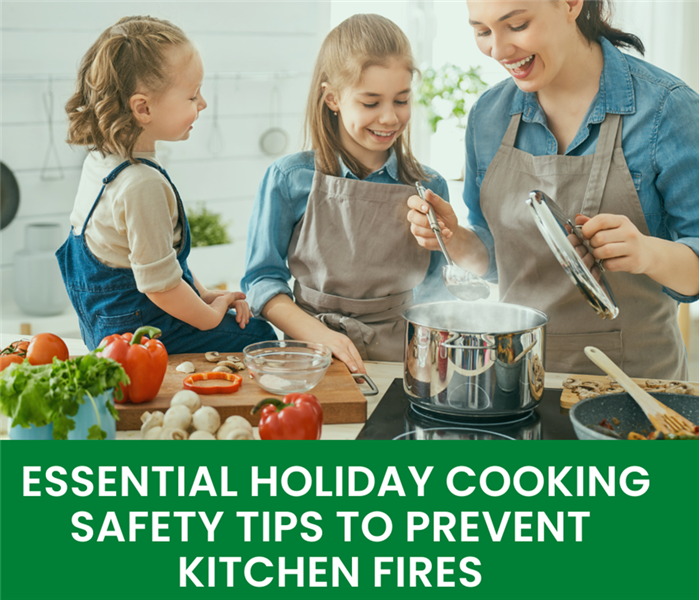 If an unexpected fire disrupts your celebrations, SERVPRO of Norwood/West Roxbury is here to help.
If an unexpected fire disrupts your celebrations, SERVPRO of Norwood/West Roxbury is here to help.
The holidays are a time for gathering with loved ones and enjoying festive meals. However, the excitement of cooking and celebrating can sometimes lead to kitchen fire hazards. Stay safe this holiday season with these essential tips for fire prevention:1. Stay Focused While Cooking
Unattended cooking is a leading cause of kitchen fires. Whether you're frying, grilling, or simmering, always remain in the kitchen while the stove is on. If you need to step away, turn off the heat. Keep flammable items like oven mitts, towels, and paper products away from stovetops and other heat sources.
2. Test Your Smoke Alarms
Before diving into holiday meal prep, ensure your smoke alarms are functional. Press the test button and replace the batteries if necessary. A working smoke alarm is a crucial early warning system in case of a fire.
3. Don’t Overload Electrical Outlets
The holidays often mean extra appliances, lights, and decorations. Avoid overloading electrical outlets, which can lead to overheating and potential fires. Use surge protectors to distribute power safely.
4. Candle Safety
Candles create a cozy holiday ambiance but can pose fire risks if not monitored. Keep them away from flammable items like curtains or wrapping paper. Always extinguish candles before leaving the room or going to bed.
5. Safety First When Deep Frying a Turkey
Planning to deep fry your holiday turkey? Take precautions by frying outdoors on a flat, non-flammable surface. Ensure the turkey is completely thawed to avoid oil splatters and potential flare-ups.
6. Clean Your Oven and Stove Vents
Grease buildup is a common culprit of kitchen fires. Regularly clean your oven, stove vents, and hood filters to prevent grease fires from disrupting your holiday festivities.
By following these safety tips, you can focus on creating memories, not handling emergencies. Remember, prevention is key to a joyful and safe holiday season!
If an unexpected fire disrupts your celebrations, SERVPRO of Norwood/West Roxbury is here to help. As a trusted restoration leader, we have the expertise and equipment to restore your home or business. Contact us anytime at (781) 769-9125.
Wishing you a safe and happy holiday season!
Fire Prevention in Commercial Buildings: Safeguarding Your Business During Heating Season
11/6/2024 (Permalink)
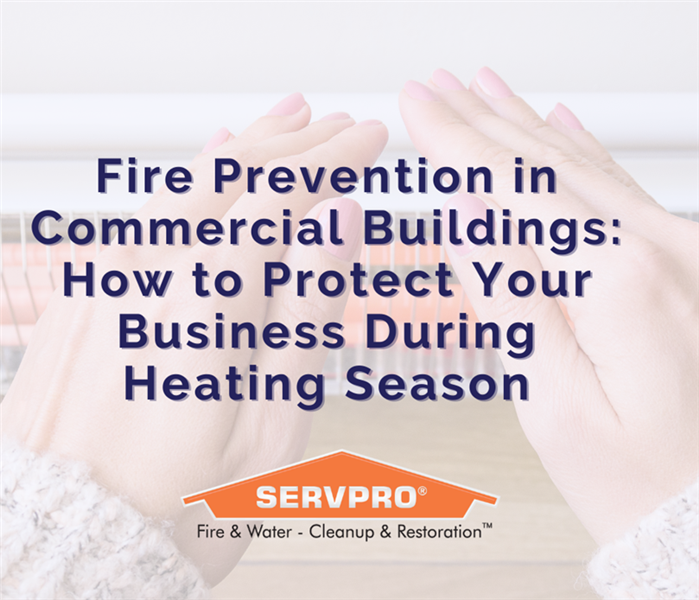 For business owners, taking preventive measures to protect property and employees is essential.
For business owners, taking preventive measures to protect property and employees is essential.
As the temperatures drop and heating systems kick into gear, the risk of fire in commercial buildings rises considerably. From heating equipment and space heaters to electrical malfunctions, several factors contribute to increased fire hazards during the colder months. For business owners, taking preventive measures to protect property and employees is essential. Here, we’ll discuss the fire hazards associated with heating season and share actionable fire prevention tips to help you safeguard your business.Common Fire Hazards During Heating Season
Recognizing the typical fire risks associated with heating season can help you prepare your building. Here are some of the main culprits:
Heating Systems
Heating systems are crucial for maintaining comfort, but if not properly maintained, they can become fire hazards. Malfunctioning furnaces, boilers, or heat pumps can overheat or leak gas, posing a significant risk. Dust buildup on heating elements and clogged vents also contribute to fire risks.
Space Heaters
Space heaters provide convenient, localized heat but are responsible for many workplace fires each year. They can easily overheat, tip over, or ignite nearby flammable materials such as paper, curtains, or furniture if not used carefully.
Electrical Malfunctions
During heating season, increased demand on electrical systems raises the risk of electrical fires. Faulty wiring, overloaded circuits, and damaged cords can spark fires, particularly in older buildings with outdated electrical infrastructure.
Flammable Materials Near Heat Sources
Storing flammable items—like cleaning supplies, paper, or chemicals—too close to heating equipment, furnaces, or space heaters is a serious risk. Even a small spark can quickly ignite these materials, turning a minor incident into a major fire.
Fire Prevention Tips for Business Owners
Preventing fires requires a combination of regular maintenance, employee training, and adherence to safety protocols. These fire prevention tips can help you reduce fire risks during heating season:
1. Schedule Regular Heating System Inspections
Arrange for your building’s heating system to be inspected and serviced annually by a licensed HVAC professional. This helps ensure safe operation and efficient performance. During the inspection, the technician will check for issues such as gas leaks, faulty wiring, or clogged vents. Regular maintenance can prevent small issues from becoming major fire hazards.
- Clean Filters and Vents: Clogged filters can restrict airflow, causing the system to overheat. Regularly clean or replace filters to ensure proper airflow and reduce fire risks.
- Test Smoke and Carbon Monoxide Detectors: Make sure all detectors are functioning properly, especially those near heating equipment. These devices can provide early warning in case of a fire or gas leak.
2. Establish Space Heater Safety Guidelines
If space heaters are used, enforce clear safety rules:
- Use Certified Heaters: Ensure all space heaters are certified by reputable testing labs (like UL or ETL) and have automatic shut-off features.
- Keep Heaters Away from Flammable Items: Place space heaters at least three feet away from anything combustible, like paper or furniture.
- Turn Off When Unattended: Space heaters should be turned off when no one is present or at the end of the workday. Consider using heaters with timers to prevent accidental overnight use.
- Use Proper Outlets: Plug heaters directly into wall outlets, avoiding power strips or extension cords, which can overload circuits.
3. Conduct Electrical Safety Inspections
Increased electrical load during heating season requires that your building’s electrical systems are prepared:
- Inspect Outlets and Cords: Look for frayed cords, loose outlets, or signs of wear. Damaged cords should be replaced immediately, and cords should not run under carpets or across doorways where they may be damaged.
- Monitor Electrical Load: Ensure circuits aren’t overloaded. If in doubt, have an electrician perform a load test to ensure compliance with electrical codes.
- Install Ground Fault Circuit Interrupters (GFCIs): GFCIs help prevent shocks and fires, particularly in damp areas. Verify that GFCI outlets are installed in kitchens, bathrooms, and other vulnerable areas.
4. Create a Fire-Safe Workspace
Keep your workspace clear of potential fire hazards:
- Clear Combustible Clutter: Avoid storing flammable items near heating sources. Keep cleaning chemicals, paper, and boxes away from heaters, electrical outlets, and other heat sources.
- Designate a Smoking Area: If smoking is permitted, ensure there’s a designated outdoor smoking area with proper disposal containers for cigarettes.
- Ensure Fire Extinguishers Are Accessible: Place extinguishers in easy-to-reach locations, particularly near kitchens, mechanical rooms, and break areas. Train employees on how to use them properly.
5. Train Employees on Fire Safety
Consistent fire safety training ensures employees know how to prevent and respond to fires:
- Using Fire Extinguishers: Familiarize employees with the PASS method—Pull, Aim, Squeeze, Sweep—for fire extinguisher use.
- Evacuation Procedures: Establish and communicate an evacuation plan, including the location of exits and assembly points. Conduct regular fire drills to keep employees prepared.
- Reporting Hazards: Encourage employees to report fire hazards, such as damaged electrical cords or malfunctioning heaters, promptly.
As the heating season begins, fire prevention becomes even more critical. Proactive measures like regular heating inspections, enforcing space heater safety guidelines, electrical safety checks, and maintaining a fire-safe workspace can greatly reduce your risk. Fire prevention requires preparation, maintenance, and employee awareness—all essential for protecting your business from the potentially devastating effects of a fire.
If you need assistance with fire safety preparations this winter, our team of experts can help with fire risk assessments, inspections, and preventive maintenance. Contact us to learn how we can keep your business safe during the colder months.
As a trusted leader in the restoration industry, Norwood/West Roxbury has the advanced training and equipment to restore your property if needed. Call us today at (781) 769-9125.
How Candles Can Cause Fires and How to Prevent Them
10/18/2024 (Permalink)
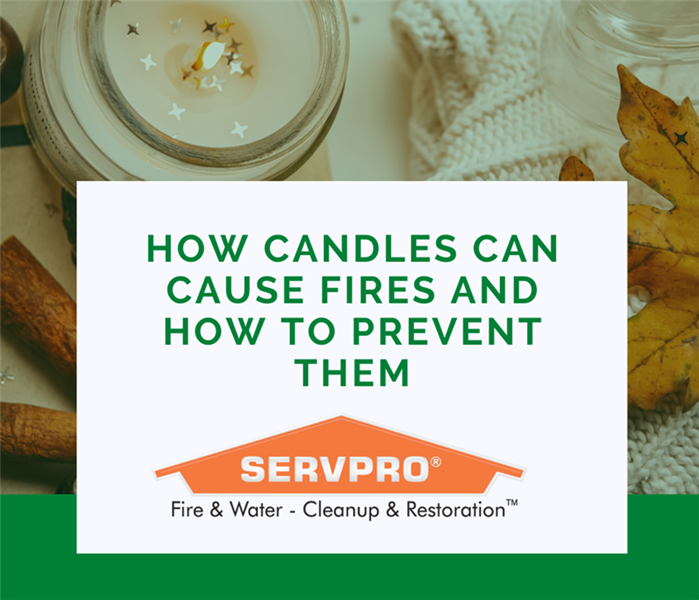 Despite their beauty and charm, candles can also pose serious fire hazards if not used properly.
Despite their beauty and charm, candles can also pose serious fire hazards if not used properly.
Despite their beauty and charm, candles can also pose serious fire hazards if not used properly. Understanding the risks and learning how to use candles safely is crucial for preventing potential fires. Here’s a comprehensive look at how candles can cause fires and how you can mitigate these risks.
1. How Candles Can Cause Fires
Candles are a common source of residential fires. Here are some of the main ways they can become dangerous:
- Unattended Flames: One of the most common causes of candle-related fires is leaving candles unattended. A candle’s flame can easily ignite nearby flammable materials if not watched closely.
- Improper Placement: Placing candles near combustible materials like curtains, paper, or furniture can lead to a fire. Candles should always be placed on a stable, heat-resistant surface away from anything that could catch fire.
- Overuse of Decorative Candles: Candles with decorative elements like leaves, feathers, or ribbons can catch fire if they get too close to the flame. These decorations can be highly flammable and should be avoided or used with caution.
- Failure to Trim Wicks: A wick that’s too long can cause a candle to burn too hot and lead to excessive flame height. This increases the risk of the candle catching nearby materials on fire. It’s essential to trim the wick to about ¼ inch before each use.
- Old or Damaged Candles: Candles that are old or have been improperly stored can become unstable. Cracked or damaged candles can cause uneven burning and increase the risk of fire.
2. Safety Tips for Using Candles
To enjoy the ambiance of candles without compromising safety, follow these important tips:
- Never Leave a Candle Unattended: Always keep an eye on burning candles. Extinguish them before leaving the room or going to sleep.
- Use Candle Holders: Place candles in sturdy, heat-resistant holders that are designed to catch wax drips and contain the flame. Ensure the holder is on a stable, non-flammable surface.
- Keep Candles Away from Flammable Items: Ensure that candles are placed away from curtains, paper, bedding, and other flammable materials. Avoid placing candles in areas where they can be easily knocked over.
- Keep Out of Reach of Children and Pets: Children and pets can accidentally knock over candles or get too close to the flame. Keep candles in locations that are out of their reach.
- Trim Wicks Regularly: Before lighting a candle, trim the wick to about ¼ inch. This helps to control the size of the flame and reduces the risk of a large, uncontrolled fire.
- Extinguish Candles Safely: Use a candle snuffer to extinguish the flame rather than blowing it out, which can spread hot wax. Make sure the candle is completely out and the wick is no longer glowing before leaving it unattended.
3. Alternative Options
If you’re concerned about the risks of traditional candles, consider these safer alternatives:
- Battery-Operated Candles: LED candles offer the appearance of real candles without the fire risk. They can be used safely in many settings and often come with timers and remote controls.
- Electric Wax Warmers: These devices melt wax without a flame, providing the pleasant scent of a candle without the fire risk.
- Scented Oil Diffusers: For a fragrance boost, consider using an oil diffuser. These devices disperse essential oils into the air and are generally safer than burning candles.
4. What to Do in Case of a Candle-Related Fire
In the event of a candle-related fire, act quickly:
- Evacuate Immediately: If a fire occurs, get out of the building as quickly and safely as possible.
- Call 911: Once you are in a safe location, call emergency services to report the fire.
- Do Not Try to Extinguish Large Fires: Leave the firefighting to professionals. Focus on getting yourself and others to safety.
Candles add a touch of elegance and warmth to any environment, but they come with inherent risks. By following safety guidelines and considering alternative products, you can enjoy the beauty of candles while minimizing the risk of fire.
SERVPRO of Norwood/West Roxbury is your comprehensive solution for residential and commercial restoration and cleaning services. Our highly trained technicians are available 24/7 to address any water, fire, or storm damage in Westwood, MA | Dedham, MA | West Roxbury, MA | Norwood, MA and surrounding areas.
Essential Tips to Keep Your Home and Family Safe
9/27/2024 (Permalink)
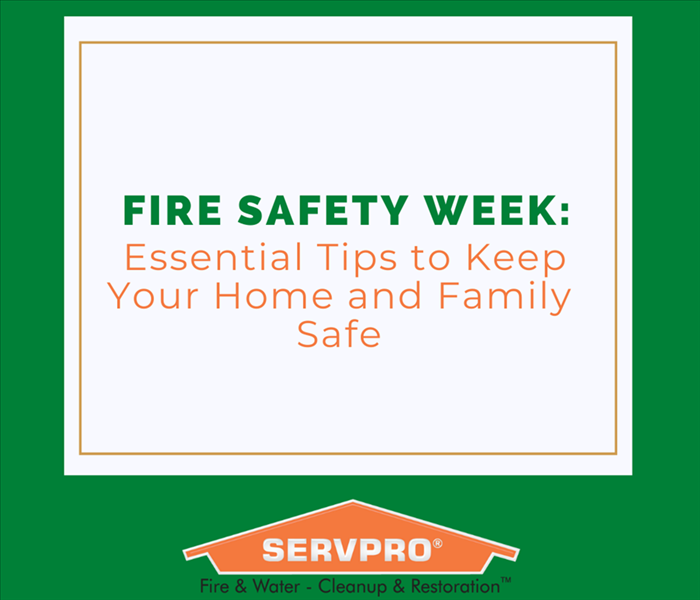 Fire Prevention Week is a perfect opportunity to focus on fire safety.
Fire Prevention Week is a perfect opportunity to focus on fire safety.
Fire Safety Week is an annual campaign dedicated to educating families and communities about fire hazards and how to prevent them. By understanding the risks and implementing key safety measures, you can protect your loved ones and home from potential disasters in Westwood, MA. Here’s how you can take action this Fire Safety Week.
1. Check Your Smoke Alarms
Smoke alarms are your first defense against a fire, providing early warnings that give you and your family crucial time to escape. Here’s what you need to do:
- Test alarms regularly: Test all smoke alarms in your home once a month to ensure they function correctly.
- Change the batteries: Replace the batteries in your smoke alarms at least once a year. A good rule of thumb is to change them when you change your clocks for daylight saving time.
- Install alarms in key areas: Every bedroom, hallway, and level of your home should have a smoke alarm.
2. Create a Family Fire Escape Plan
In a fire, every second counts. Having a clear escape plan can save lives. Take time to:
- Identify two exits per room: If one exit is blocked, having a second way out is essential.
- Designate a meeting spot: Choose a safe place outside, away from the house, where everyone should meet in case of a fire.
- Practice regularly: Conduct fire drills with your family at least twice a year so everyone knows what to do in an emergency.
3. Stay Safe in the Kitchen
Cooking is the leading cause of home fires. Here are some simple precautions to prevent kitchen fires:
- Never leave cooking unattended: If you must leave the kitchen, turn off the stove or have someone watch over the cooking.
- Keep flammable objects away from the stove: This includes dish towels, paper towels, and oven mitts.
- Have a fire extinguisher nearby: Know how to use it properly in case of a small fire.
4. Practice Space Heater Safety
As colder weather approaches, space heaters become a common fire risk. Follow these tips to stay warm safely:
- Keep space heaters at least 3 feet away from anything flammable. This includes furniture, curtains, and bedding.
- Turn off heaters when you leave the room or go to bed. Never leave them unattended.
5. Stop Fires Before They Start
While we can't predict when or where a fire will break out, we can reduce the chances by taking proactive steps:
- Keep your home clutter-free: Especially around areas that are prone to fires, like the kitchen and around electrical outlets.
- Check electrical cords: Damaged or frayed wires can cause sparks and lead to fires. Replace cords immediately if you see wear and tear.
- Store flammable materials safely: Items like gasoline, cleaning supplies, and aerosol cans should be kept in well-ventilated areas, away from heat sources.
6. Use Candles Responsibly
While candles can create a cozy atmosphere, they’re also a common fire hazard. If you use candles, be sure to:
- Blow them out before leaving the room. Never leave a candle unattended, especially if children or pets are present.
- Use sturdy candle holders. Make sure the holder is on a flat, stable surface, and away from flammable objects.
Fire Prevention Week is a perfect opportunity to focus on fire safety. By taking the time to check alarms, create a fire escape plan, and follow these safety tips, you can make your home a safer place in Westwood, MA
SERVPRO of Norwood/West Roxbury is your comprehensive solution for residential and commercial restoration and cleaning services. Our highly trained technicians are available 24/7 to address any water, fire, or storm damage in Westwood, MA | Dedham, MA | West Roxbury, MA | Norwood, MA and surrounding areas.
The Do’s and Don’ts of Fall Leaf Burning
9/7/2024 (Permalink)
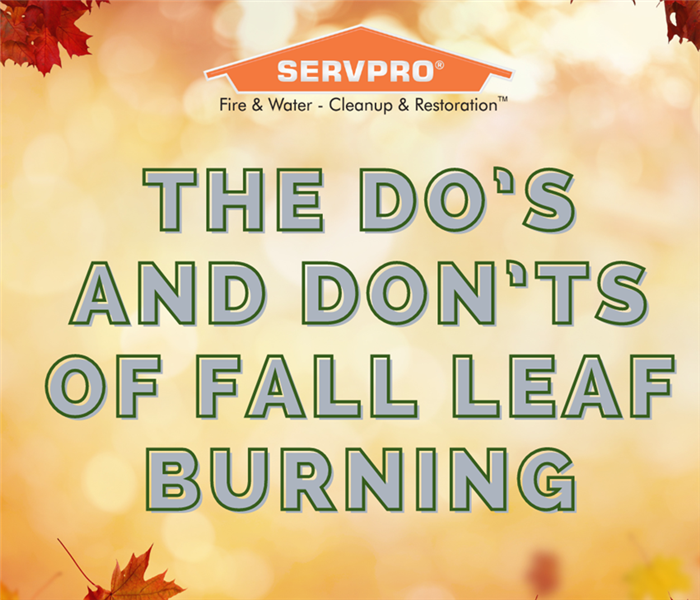 Here’s a guide to help you burn your leaves safely and responsibly in Westwood, MA.
Here’s a guide to help you burn your leaves safely and responsibly in Westwood, MA.
As the leaves begin to change color and fall, many homeowners find themselves with an abundance of leaves in their yards. While some opt for composting or mulching, others choose to burn their leaves. If you’re considering burning your leaves this fall, it’s crucial to do so safely. Improper leaf burning can lead to wildfires, air pollution. Here’s a guide to help you burn your leaves safely and responsibly in Westwood, MA.
The Do’s of Leaf Burning
- Check Local Regulations: Before you even consider burning leaves, it’s important to check your local laws and regulations. Some municipalities have strict rules or outright bans on leaf burning due to environmental concerns or fire risks. Always verify if a permit is needed and understand the guidelines you must follow.
- Choose a Safe Location: Pick a location that’s far from your home, sheds, fences, trees, or any other structures. Ensure there’s at least a 50-foot distance between the burning area and any buildings or flammable materials. A flat, open area with little wind is ideal.
- Create a Firebreak: A firebreak is a barrier that prevents the spread of fire. Surround your burn area with a firebreak made of bare soil or non-flammable materials, such as gravel. This helps contain the fire and keeps it from spreading to unintended areas.
- Burn on a Calm, Dry Day: Wind can cause embers to spread quickly, so only burn on a day with little to no wind. Additionally, wet leaves don’t burn well and can create excessive smoke, so choose a dry day for burning.
- Have Water and Tools Ready: Always have a hose, buckets of water, or a fire extinguisher nearby in case the fire gets out of control. A rake or shovel can also help you manage the fire by spreading out the leaves or smothering any rogue flames.
The Don’ts of Leaf Burning
- Don’t Burn Large Piles: Burning a large pile of leaves can be difficult to control. Instead, burn small piles, adding more leaves as the previous ones burn down. This will make it easier to manage the fire and reduce the risk of it spreading.
- Don’t Burn Near Vegetation or Wooded Areas: Burning leaves too close to trees, bushes, or other vegetation can cause the fire to spread quickly. Always maintain a safe distance from any vegetation to prevent accidental wildfires.
- Don’t Leave the Fire Unattended: Never leave a burning pile of leaves unattended. Stay with the fire at all times, and only burn as much as you can monitor. If you need to step away, extinguish the fire completely before doing so.
- Don’t Burn in High Winds or During a Drought: Wind can carry embers far beyond your burn area, potentially igniting other areas. Similarly, dry conditions during a drought increase the likelihood of wildfires. Avoid burning leaves under these conditions to prevent accidental fires.
- Don’t Use Accelerants: Using gasoline, lighter fluid, or other accelerants to start or maintain your fire is dangerous. These substances can cause the fire to become uncontrollable, leading to serious accidents or injuries. Stick to natural methods, such as matches or a lighter, to start your fire.
Alternative Leaf Disposal Methods
If burning leaves seems too risky, consider these safer alternatives:
- Composting: Turn your leaves into nutrient-rich compost for your garden. Over time, they’ll break down and create a valuable soil amendment.
- Mulching: Shred the leaves and use them as mulch around your plants and trees. This not only recycles the leaves but also helps retain moisture in the soil and suppresses weeds.
- Municipal Collection: Many towns offer curbside leaf collection services. Check with your local government to see if this is an option for you.
Burning leaves can be a convenient way to deal with autumn’s bounty, but it comes with risks.
SERVPRO of Norwood/West Roxbury is your comprehensive solution for residential and commercial restoration and cleaning services. Our highly trained technicians are available 24/7 to address any water, fire, or storm damage in Westwood, MA | Dedham, MA | West Roxbury, MA | Norwood, MA and surrounding areas.
Fire Safety During Summer Storms: Tips to Protect Your Property in Norwood, MA
8/27/2024 (Permalink)
 Summer storms bring unique fire hazards that can pose significant risks to your property.
Summer storms bring unique fire hazards that can pose significant risks to your property.
Summer storms bring unique fire hazards that can pose significant risks to your property. Lightning strikes, downed power lines, and other storm-related issues can ignite fires, making it crucial to take proactive measures to safeguard your home. Here are some essential tips to protect your property from fire hazards during summer storms in Norwood, MA.
Lightning Strikes: Lightning is a common cause of fires during summer storms. It can strike trees, power lines, and buildings, sparking fires that spread quickly.
Downed Power Lines: Strong winds and heavy rain can cause power lines to fall, creating sparks that can ignite nearby vegetation or structures.
Power Surges: Electrical storms can cause power surges, potentially leading to fires if your home’s electrical system is not adequately protected.
Tips to Protect Your Property
Use Surge Protectors: Protecting your home’s electrical system from power surges is crucial during summer storms. Here’s how:
- Install Whole-House Surge Protectors: A whole-house surge protector can safeguard your home’s electrical system by diverting excess voltage away from your appliances and wiring.
- Use Point-of-Use Surge Protectors: Plug sensitive electronics, such as computers, televisions, and kitchen appliances, into surge protector power strips.
- Unplug Electronics During Storms: If a severe storm is forecasted, unplug non-essential electronics to prevent damage from potential power surges.
Keep Dry Vegetation Trimmed: Dry vegetation around your home can easily ignite and fuel a fire. Maintaining your landscape is a crucial step in fire prevention:
- Trim Trees and Shrubs: Regularly trim trees and shrubs, especially those near your home and power lines, to prevent them from catching fire if struck by lightning.
- Remove Dead Plants: Clear away dead plants, leaves, and other debris that can act as kindling.
- Maintain a Defensible Space: Create a defensible space around your home by keeping at least a 30-foot radius clear of flammable vegetation and materials.
Maintain Clear Evacuation Routes: In the event of a fire, having clear and accessible evacuation routes is vital for the safety of your family:
- Plan and Practice: Develop an evacuation plan and practice it regularly with all household members. Ensure everyone knows at least two ways to exit each room.
- Keep Exits Clear: Ensure that windows, doors, and pathways are free from obstructions and can be easily accessed in an emergency.
- Emergency Supplies: Prepare an emergency kit with essentials such as water, non-perishable food, medications, and important documents. Keep it in a location that’s easy to grab quickly.
Additional Fire Safety Tips
- Install Smoke Alarms: Ensure smoke alarms are installed on every level of your home and outside sleeping areas. Test them monthly and replace batteries at least once a year.
- Use Fire-Resistant Building Materials: If you’re building or renovating, consider using fire-resistant materials for your roof, siding, and deck to reduce the risk of ignition.
- Stay Informed: Keep an eye on weather forecasts and be aware of any fire weather warnings in your area. Sign up for local emergency alerts to stay informed about potential fire risks.
By understanding the fire hazards associated with summer storms and taking these preventative measures, you can significantly reduce the risk of fire damage to your property. Stay vigilant and proactive to ensure your home and family remain safe during stormy weather.
SERVPRO of Norwood/West Roxbury is your comprehensive solution for residential and commercial restoration and cleaning services. Our highly trained technicians are available 24/7 to address any water, fire, or storm damage in Westwood, MA | Dedham, MA | West Roxbury, MA | Norwood, MA and surrounding areas.
Sparkling Celebrations: A Guide to Fireworks Safety
7/4/2024 (Permalink)
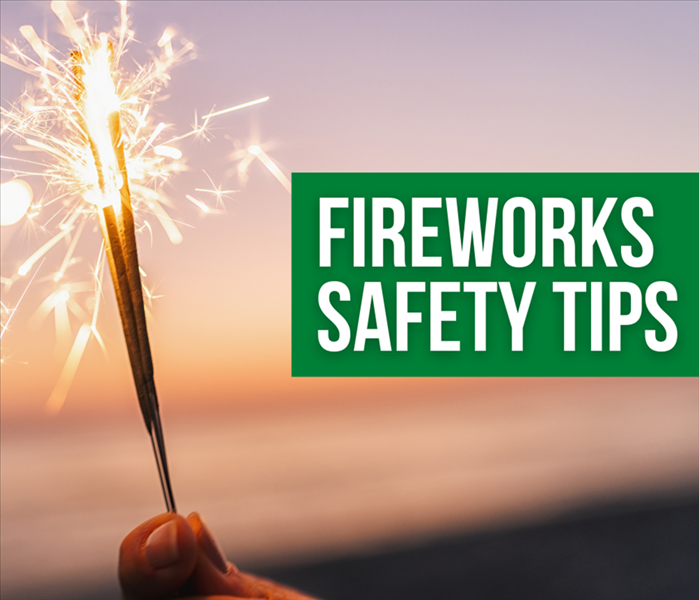 By following these safety guidelines, you can enjoy a dazzling fireworks display while ensuring the well-being of yourself and those around you.
By following these safety guidelines, you can enjoy a dazzling fireworks display while ensuring the well-being of yourself and those around you.
Fireworks add a touch of magic to any celebration, but they come with inherent risks. To ensure your festivities are both enjoyable and safe, it's crucial to follow proper fireworks safety guidelines. Here are some essential tips to keep in mind in Dedham, MA:
Buy from Reliable Sources
Purchase fireworks only from licensed and reputable sellers. Avoid homemade or illegal fireworks, as they can be extremely dangerous.
Read the Instructions
Before igniting any fireworks, carefully read and understand the instructions. Pay attention to the recommended safety distances and methods of use.
Designate a Shooter
Assign a responsible adult to handle the fireworks. This person should not consume alcohol or any impairing substances during the event.
Keep a Safe Distance
Maintain a safe distance between the fireworks and the audience. Follow the recommended safety distances provided on the fireworks packaging.
Wear Protective Gear
Wear safety glasses and ear protection when handling fireworks. Cotton clothing is preferable to synthetic materials, which can melt if a spark lands on them.
Follow Lighting Instructions
Use a flashlight to read the labels and fuses in the dark. Light the fireworks at arm's length, and then quickly move away to a safe distance.
Keep Water Handy
Have a bucket of water or a hose nearby to extinguish any fires or mishaps. Soak used fireworks in water before disposing of them.
No Relighting
If a firework fails to ignite, do not attempt to relight it. Wait at least 20 minutes, then soak it in water before disposal.
Ensure Pet Safety
Keep pets indoors during fireworks displays. The loud noises can frighten them, leading to unpredictable behavior.
Follow Local Laws
Familiarize yourself with local laws and regulations regarding fireworks. Respect any bans or restrictions in your area.
Stay Sober
Never handle fireworks if you have consumed alcohol or drugs. Your judgment and coordination may be impaired, increasing the risk of accidents.
Dispose of Fireworks Properly
After the show, clean up the area. Dispose of fireworks debris in a metal container, as they can still be hot and pose a fire risk.
By following these safety guidelines, you can enjoy a dazzling fireworks display while ensuring the well-being of yourself and those around you. Remember, safety should always be the top priority when handling fireworks.
Choose the #1 Experts in Cleanup and Restoration for Residential and Commercial Fire, Mold, Water, and Storm Damage. Contact us today! We can assist with your damage and restoration needs in Dedham, MA.
Keep Your Grill Sessions Safe and Fun This Season!
6/24/2024 (Permalink)
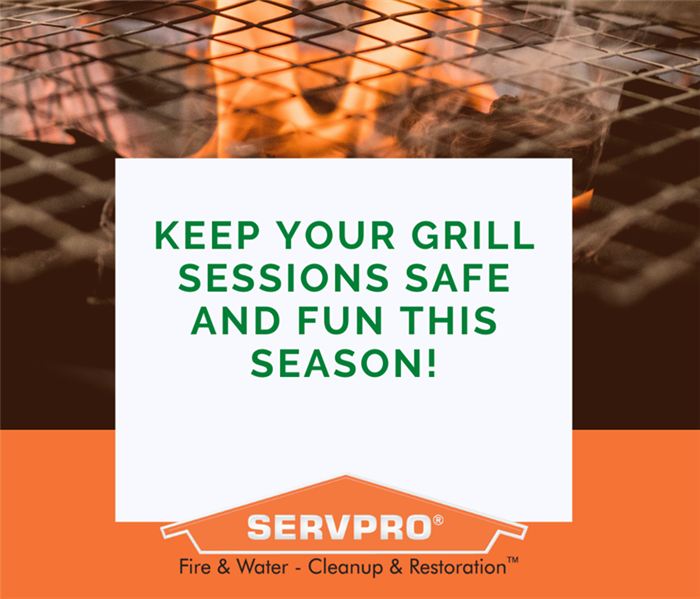 Ensuring safety while grilling is crucial to prevent any fire hazards.
Ensuring safety while grilling is crucial to prevent any fire hazards.
As the weather warms up, it's the perfect time to fire up the grill and enjoy some delicious outdoor cooking with family and friends. However, ensuring safety while grilling is crucial to prevent any fire hazards. Follow these simple tips to keep your grilling sessions safe and fun this season!
Position Your Grill Safely
- Distance Matters: Place your grill at least 10 feet away from your house, deck railings, and overhanging branches.
- Stable Surface: Ensure your grill is on a stable, non-flammable surface to avoid tipping over.
Maintain Your Grill
- Clean Regularly: Grease buildup can cause flare-ups. Clean your grill grates and drip trays before and after each use.
- Check for Leaks: Inspect gas grills for leaks by applying a light soap and water solution to the hose. If bubbles appear, there's a leak.
Safe Lighting Practices
- Open Lid First: Always open the lid before lighting your gas grill to prevent gas buildup.
- Use Long Matches or Lighters: For charcoal grills, use long matches or lighters to ignite safely.
Supervise and Protect
- Never Leave Unattended: Stay close by when grilling to monitor and manage any potential hazards.
- Keep Kids and Pets Away: Maintain a safe zone of at least 3 feet around the grill.
Be Prepared for Emergencies
- Fire Extinguisher: Keep a fire extinguisher nearby and know how to use it.
- Baking Soda and Sand: Have baking soda for grease fires and sand or a bucket of water for charcoal fires.
Remember These Important No-No’s:
- No Flammable Liquids: Never use gasoline or other flammable liquids to start your grill.
- No Grilling Indoors: Grilling indoors or in an enclosed area can lead to carbon monoxide poisoning.
Stay safe, have fun, and enjoy those summer cookouts! Choose the #1 experts in cleanup and restoration for residential and commercial fire, mold, water, and storm damage. Contact us today! We can assist with your damage and restoration needs in Walpole, MA.
Understanding Commercial Fires in East Dedham, MA
4/23/2024 (Permalink)
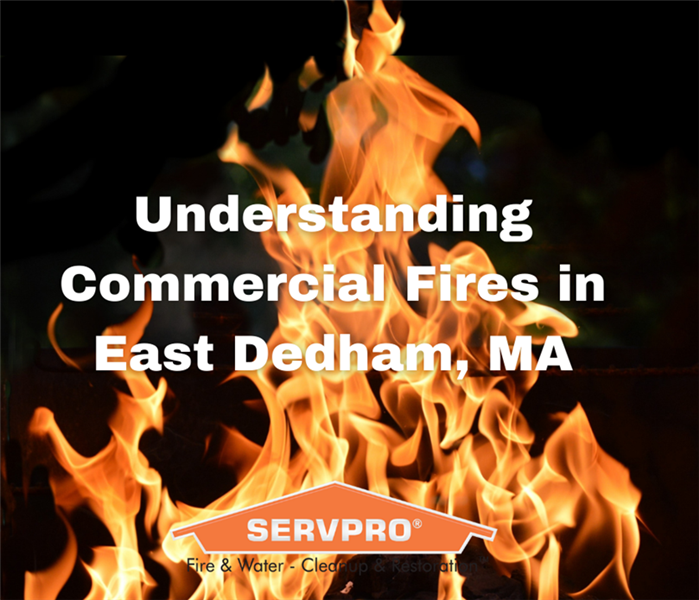 For business owners, few disasters are as devastating as a commercial fire.
For business owners, few disasters are as devastating as a commercial fire.
For business owners, few disasters are as devastating as a commercial fire.
The impacts can reverberate through operations, finances, employee safety and your community. Understanding the root causes, implementing prevention protocols, and knowing how to recover swiftly are critical for protecting your assets and future.
Common Causes of Commercial Fires
Commercial fires frequently stem from electrical malfunctions, heating system issues, human error like unattended cooking, improper storage of flammable materials, or even arson. Identifying and mitigating these risks is paramount.
Proven Prevention Strategies
Reducing fire risks requires a multilayered approach of regular maintenance of all systems, comprehensive employee fire safety training, proper storage of combustibles, enforced smoking policies, and working fire detection/suppression equipment like alarms and sprinklers.
The Road to Recovery
Should the unthinkable occur, a fire at your business, there are key steps for recovery. Quickly assessing the damage, contacting your insurer, securing the property from further harm, professional cleanup/restoration, and meticulous reconstruction planning are vital for reopening successfully.
Don't let a commercial fire derail your operations and jeopardize your livelihood. Rapidly responding and involving professional fire restoration experts is crucial for mitigating damage, ensuring proper cleanup, and getting your business back up and running efficiently after a fire disaster.
Service Areas
Westwood, MA | Dedham, MA | West Roxbury, MA | Norwood, MA | East Dedham, MA | Norwood Centre, MA | Endicott, MA | Walpole, MA
Common Challenges Homeowners May Encounter After A Fire in Norwood / West Roxbury MA
4/7/2024 (Permalink)
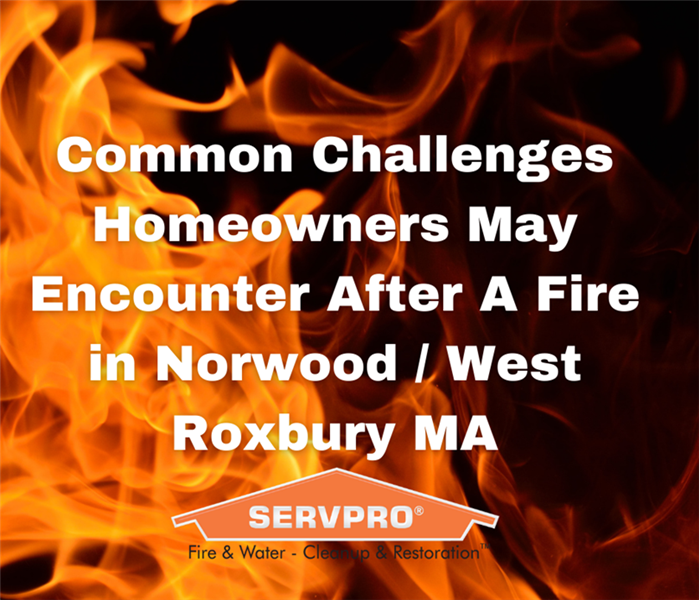 Despite the challenges, rebuilding after a fire is possible with patience, perseverance, and support.
Despite the challenges, rebuilding after a fire is possible with patience, perseverance, and support.
After a devastating house fire, the path to recovery can seem long and daunting.
Beyond the physical destruction, homeowners often face numerous obstacles when rebuilding their homes and lives. In this guide, we'll explore some of the most common challenges homeowners encounter after a fire and provide tips to help navigate the process.
Dealing with Insurance Companies: One of the first hurdles is dealing with insurance companies. Understanding your policy, thoroughly documenting the damage, and negotiating with adjusters can be overwhelming. Keep detailed records of all communication and damages, and don't hesitate to seek assistance from a public adjuster if needed.
Finding Reputable Contractors: Locating reliable contractors to repair fire damage can be challenging, especially in areas with high demand. Research contractors thoroughly, check references, and obtain multiple quotes. Working with a contractor specializing in fire damage restoration can streamline the process and ensure a high-quality rebuild.
Coping with the Emotional Toll: The emotional impact of losing your home and possessions can be immense. Grief, anger, and frustration are normal reactions. Seek support from friends, family, or a counselor to cope with these emotions and navigate the rebuilding journey.
Navigating Building Codes and Permits: Rebuilding often requires navigating complex building codes and obtaining permits. Work closely with a contractor familiar with local regulations to ensure your home meets all safety standards.
Managing Financial Strain: Rebuilding can be financially challenging, especially if you're not fully covered by insurance. Explore government assistance programs, crowdfunding options, or loans to help cover the costs.
Despite the challenges, rebuilding after a fire is possible with patience, perseverance, and support. By seeking assistance from professionals, staying organized, and prioritizing emotional well-being, homeowners can successfully restore their homes and move forward after this devastating event.
Service Areas
Westwood, MA | Dedham, MA | West Roxbury, MA | Norwood, MA | East Dedham, MA | Norwood Centre, MA | Endicott, MA | Walpole, MA
Flames Extinguished, Hopes Rekindled: Top-notch Fire Restoration Services in Norwood West Roxbury
2/12/2024 (Permalink)
 The expertise, efficiency, and compassion of professional fire restoration experts play a pivotal role.
The expertise, efficiency, and compassion of professional fire restoration experts play a pivotal role.
A fire can leave behind devastation and despair, but once the flames are extinguished, the journey of rebuilding begins. In the aftermath of such a catastrophic event, the importance of exceptional fire restoration services cannot be overstated. Let's delve into the crucial role that professional fire restoration experts play in aiding individuals and businesses to rise from the ashes and reignite their hopes.
- Immediate Response for Damage Control: The aftermath of a fire demands swift attention to prevent further damage. Professional fire restoration services understand this urgency and respond promptly. Their rapid actions not only mitigate existing damage but also forestall secondary issues like water damage resulting from firefighting efforts.
- Thorough Assessment of Fire Damage: Fire damage is multifaceted, impacting structures, belongings, and overall property safety. Seasoned fire restoration teams conduct a meticulous assessment to gauge the extent of the damage. This evaluation serves as the foundation for crafting a comprehensive restoration plan tailored to each unique case's needs.
- Smoke and Soot Removal: In addition to visible fire damage, smoke and soot residues can infiltrate every corner of a property. Professional restoration services employ specialized equipment and techniques to eradicate smoke and soot, ensuring a pristine and safe environment for restoration endeavors.
- Structural Repairs and Reconstruction: Fires can compromise a building's structural integrity. Proficient restoration experts are equipped to handle structural repairs and reconstruction, ensuring that the property not only regains its aesthetic appeal but also meets safety standards.
- Content Restoration and Cleaning: Items affected by fire and smoke necessitate meticulous restoration. Fire restoration professionals utilize advanced cleaning and restoration methods to salvage personal belongings, furniture, and valuables. This can significantly alleviate the emotional toll on individuals who have lost cherished possessions.
- Odor Elimination: Lingering odors from smoke and fire can persist long after the flames are extinguished. Fire restoration services employ specialized deodorization techniques to effectively eliminate odors, providing a fresh and clean living or working environment.
- Insurance Coordination and Documentation: Navigating insurance claims post-fire can be intricate. Fire restoration experts often assist in coordinating with insurance providers, documenting the damage, and providing accurate assessments. This streamlined process expedites the insurance claims process for a swifter recovery.
- Emotional Support and Guidance: Recovering from a fire entails not only physical restoration but also emotional healing. Professional fire restoration teams offer support and guidance, aiding individuals and families in navigating the challenges of rebuilding and reigniting hopes for the future.
In the face of fire, the road to recovery may appear daunting, but with top-tier fire restoration services, flames can be extinguished, and hopes can be rekindled. The expertise, efficiency, and compassion of professional fire restoration experts play a pivotal role in assisting individuals and businesses in rising from the ashes and rebuilding their lives. When confronted with the aftermath of a fire, trust in the capabilities of fire restoration professionals to lead the way to a brighter and restored future in Norwood West Roxbury.
SERVPRO Of Norwood West Roxbury remains the premier choice in Cleanup and Restoration for residential and commercial buildings afflicted by fire, mold, water, and storm damage.
Understanding the Different Types of Fire and Smoke Damage In Norwood West Roxbury, MA.
1/24/2024 (Permalink)
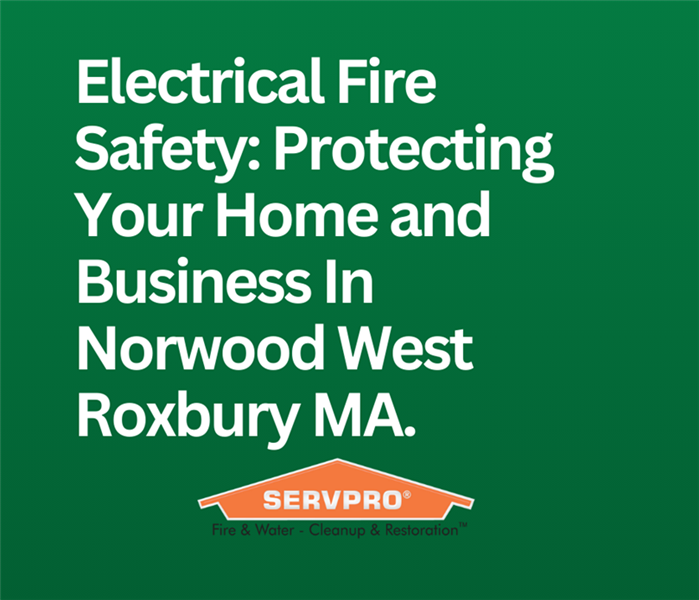 A nuanced understanding of the different types of fire and smoke damage is a fundamental step in the restoration process
A nuanced understanding of the different types of fire and smoke damage is a fundamental step in the restoration process
Confronting a fire is an emotionally wrenching experience, and the aftermath encompasses not only the evident destruction caused by flames but also the far-reaching consequences of smoke.
Fire and smoke damage exhibit diverse characteristics, and grasping these distinctions is vital for a successful restoration and recovery process. Here, we delve into the various types of fire and smoke damage, along with the challenges inherent in each category.
Structural Damage:
- Description: Structural damage is the most conspicuous outcome of a fire, impacting walls, floors, ceilings, and other integral building elements.
- Causes: Direct exposure to flames, elevated temperatures, and the compromise of material integrity during the fire.
- Challenges: Evaluating and rectifying structural damage often necessitates collaboration among structural engineers, contractors, and restoration specialists.
Soot Damage:
- Description: Soot is a fine, black residue comprised of carbon particles generated by incomplete combustion. It can coat surfaces and possessions, leaving behind a distinctive odor and stains.
- Causes: Incomplete combustion of organic materials during a fire, releasing fine particles that settle on surfaces.
- Challenges: Cleaning soot demands specialized techniques and equipment to prevent smearing and further damage.
Smoke Damage:
- Description: Smoke damage encompasses the repercussions of smoke on surfaces, belongings, and indoor air quality, typically manifesting as discoloration, odors, and corrosive residues.
- Causes: The intricate mixture of gases, chemicals, and particles released during a fire that adhere to surfaces and materials.
- Challenges: Addressing smoke damage comprehensively requires proper ventilation, air purification, and targeted cleaning.
Water Damage:
- Description: Water damage is a secondary consequence of firefighting efforts, arising from the use of water to extinguish flames. It can lead to issues such as mold growth and structural deterioration.
- Causes: Firefighters' use of water or other suppressants to extinguish the fire.
- Challenges: Swift water extraction, drying, and dehumidification are crucial to prevent further damage and mitigate the risk of mold growth.
Corrosion Damage:
- Description: Corrosion occurs when acidic byproducts of combustion react with metals, resulting in deterioration and discoloration.
- Causes: Interaction between acidic residues in smoke and metal surfaces.
- Challenges: Immediate cleaning and treatment of metal surfaces are necessary to prevent irreversible corrosion damage.
Odor Damage:
- Description: Lingering odors are a common post-fire issue, stemming from the combustion of various materials.
- Causes: Absorption of smoke particles into porous surfaces, making odors challenging to eliminate.
- Challenges: Effective odor removal necessitates specialized techniques such as ozone treatment or thermal fogging to neutralize and eliminate persistent smells.
Coping with the aftermath of a fire entails addressing various types of damage, each requiring specific expertise and techniques. Restoration professionals play a pivotal role in evaluating and mitigating these damages, aiding individuals and businesses in rebuilding and recovering from the devastating effects of fire and smoke.
A nuanced understanding of the different types of fire and smoke damage is a fundamental step in the restoration process, ensuring a comprehensive and effective approach to recovery in Norwood West Roxbury.
Electrical Fire Safety: Protecting Your Home and Business In Norwood West Roxbury, MA.
1/22/2024 (Permalink)
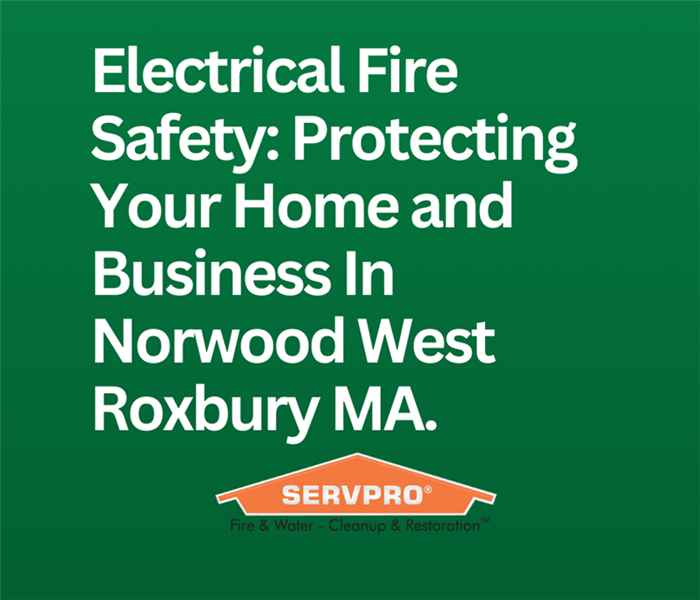 Stay informed, stay safe, and empower others with the knowledge needed to prevent electrical fires in Norwood West Roxbury.
Stay informed, stay safe, and empower others with the knowledge needed to prevent electrical fires in Norwood West Roxbury.
Electricity plays a pivotal role in our daily lives, powering our homes and businesses.
However, its use comes with inherent risks, and the threat of electrical fires poses serious dangers to both life and property. A comprehensive understanding of electrical fire safety is essential for mitigating these risks and ensuring the safety of occupants. Let's explore key measures to enhance electrical fire safety both at home and in the workplace.
Common Causes of Electrical Fires:
- Faulty Wiring: Aging or improperly installed wiring can be a source of electrical fires. Regular inspections and maintenance are crucial to identifying and addressing potential issues.
- Overloaded Circuits: Plugging numerous devices into a single outlet or overloading circuits can generate excessive heat, leading to sparks and fires. Distributing electrical loads evenly and avoiding the daisy-chaining of multiple power strips is essential.
- Malfunctioning Appliances: Appliances with damaged cords or internal components can become fire hazards. Regular inspection and timely replacement of damaged cords, following manufacturer guidelines for maintenance, are imperative.
- Electrical Equipment Issues: Faulty electrical equipment, such as circuit breakers or outlets, can contribute to electrical fires. Regular checks to ensure all electrical components are in good working condition are necessary.
- Flammable Materials Near Outlets: Placing flammable materials close to electrical outlets or equipment increases the risk of fire. Keeping these areas clear minimizes potential hazards.
Electrical Fire Safety Tips for Homes and Businesses:
- Regular Inspections and Maintenance: Schedule periodic inspections of the electrical system, especially in older structures. Look for signs of wear, exposed wires, or scorch marks. Promptly address any issues with the help of a qualified electrician.
- Avoid Overloading Circuits: Be mindful of the number of devices plugged into outlets and avoid overloading circuits. Use power strips with built-in surge protection to safeguard against voltage spikes.
- Proper Use of Extension Cords: Limit the use of extension cords to temporary solutions. Avoid daisy-chaining multiple extension cords together.
- Upgrade Wiring and Electrical Panels: Consider upgrading outdated wiring or electrical panels to meet current safety standards, significantly reducing the risk of electrical fires.
- Appliance Safety: Regularly check appliances for signs of damage, replace frayed or worn-out cords, and follow manufacturer guidelines for maintenance. Avoid leaving appliances unattended when in use.
- Install Smoke Alarms: Ensure smoke alarms are strategically placed in key areas. Regularly test and replace batteries to guarantee functionality.
- Emergency Response Plan: Develop and communicate an emergency response plan that includes procedures for dealing with electrical fires. Ensure all occupants are aware of evacuation routes and the location of fire extinguishers.
Electrical fire safety is a collective responsibility that requires vigilance and proactive measures. By staying informed, conducting regular inspections, and implementing safety measures, the risk of electrical fires can be significantly reduced at home and in the workplace. Prioritizing electrical safety not only protects property but, more importantly, ensures the safety and well-being of individuals. Stay informed, stay safe, and empower others with the knowledge needed to prevent electrical fires in Norwood West Roxbury.
What to Do in the Event of a Fire in Norwood West Roxbury.
12/7/2023 (Permalink)
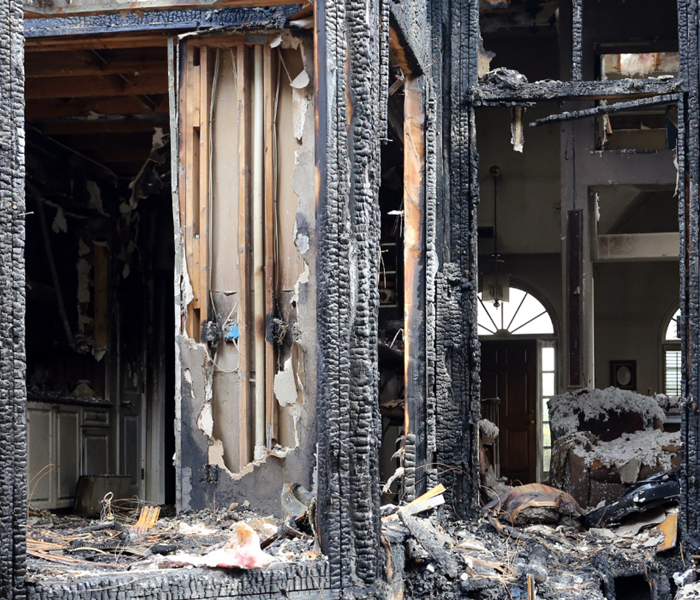 Preparation for fire emergencies involves education, awareness, and practice.
Preparation for fire emergencies involves education, awareness, and practice.
Fires can be highly unpredictable, escalating swiftly and posing grave threats to both life and property.
Whether at home, work, or in public spaces, the key to minimizing risks lies in preparedness and understanding how to respond when faced with a fire emergency in Norwood West Roxbury.
Maintain Composure and Stay Alert:
In any emergency, maintaining a calm demeanor is paramount. Panic can impede clear thinking and swift decision-making. If you come across a fire or hear a fire alarm, stay composed and alert those around you. Time is critical in fire emergencies, and a collected mindset facilitates prompt and effective action.
Immediate Evacuation is Essential:
Prioritize your safety and that of others. If the fire is small and manageable, attempt to control it with a suitable fire extinguisher. However, if the fire is spreading or you feel unsafe, evacuate the area immediately. Do not waste time gathering belongings; prioritize swift evacuation.
Follow Designated Exit Routes:
In public spaces or buildings, acquaint yourself with exit routes and emergency exits. During a fire, calmly follow these routes and assist others, especially those with mobility challenges. Avoid using elevators during a fire; opt for stairwells instead.
Crawl Low in Smoky Conditions:
Smoke inhalation is a significant risk during fires. If there's smoke, stay close to the ground where the air is clearer. By crawling low, you can minimize the risk of inhaling harmful gases, increasing your chances of reaching safety.
Promptly Call for Assistance:
Once outside the building safely, immediately contact emergency services. Furnish accurate information about the fire's location and nature. Refrain from re-entering the building unless instructed by emergency personnel.
Gather at a Designated Meeting Point:
In residential or workplace settings, establish a meeting point at a safe distance from the building. This ensures quick accountability and provides emergency responders with accurate information about who may still be inside.
No Re-entry into Burning Buildings:
Under no circumstances should you re-enter a burning building. Allow trained firefighters to handle the situation. Re-entering poses extreme danger and may result in severe injuries or loss of life.
Adhere to Fire Prevention Measures:
Preventing fires is as crucial as knowing how to respond to them. Regularly check smoke detectors, electrical systems, and heating appliances. Avoid overloading electrical outlets and practice safe cooking habits. Proactive fire prevention significantly reduces the risk of fire incidents.
Preparation for fire emergencies involves education, awareness, and practice. By remaining calm, evacuating promptly, and adhering to safety procedures, you safeguard yourself and others. Regularly reviewing and practicing these steps ensures effective response readiness, contributing significantly to overall community safety.
SERVPRO Of Norwood West Roxbury is The #1 Choice in Cleanup and Restoration for residential and commercial buildings’ fire damage.
A Guide to Christmas Fire Safety in Norwood West Roxbury MA.
11/8/2023 (Permalink)
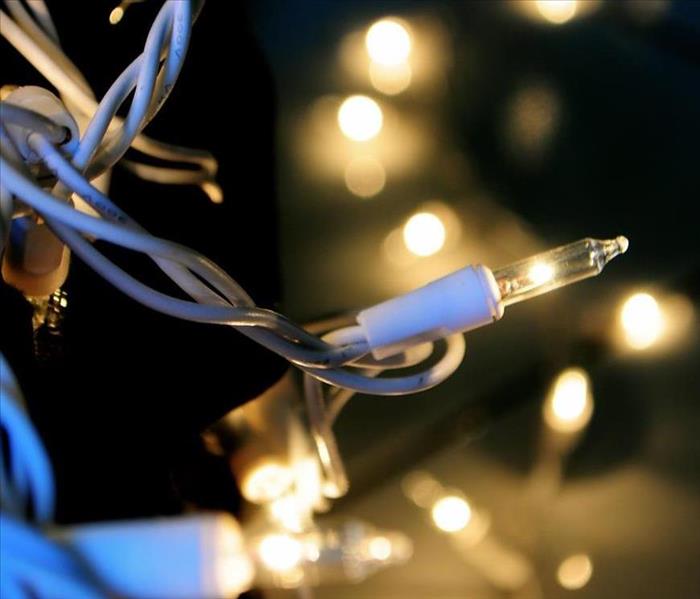 By taking simple precautions and being mindful of fire safety, you can ensure that the holiday season remains merry and bright for everyone.
By taking simple precautions and being mindful of fire safety, you can ensure that the holiday season remains merry and bright for everyone.
As the holiday season draws near, families come together, homes are adorned with shimmering lights and decorations, and the enticing scent of delectable meals permeates the air. Yet, amid the festivities, prioritizing safety—especially concerning fire safety—is of paramount importance for a joyous and secure Christmas celebration. Here are some indispensable tips to ensure a Merry and safe Christmas for you and your loved ones.
Thoughtful Decoration Placement:
Embracing the tradition of decking the halls with festive decorations is a beloved Christmas ritual. However, it's crucial to exercise mindfulness in where and how these adornments are placed. Keep flammable materials, such as curtains, tablecloths, and other decorations, at a safe distance from heat sources like candles and fireplaces. Opt for decorations that are flame-resistant or flame-retardant whenever possible.
Candle Safety:
While candles contribute to a warm and inviting atmosphere, they also pose a notable fire hazard. If you appreciate the glow of candlelight, consider using flameless LED candles as a safer alternative. If traditional candles are your preference, never leave them unattended, ensure they are kept away from children and pets, and place them in stable holders on a flat surface.
Inspect Christmas Lights:
Before adorning your space with Christmas lights, carefully inspect them for any signs of damage, such as frayed wires, broken bulbs, or exposed wiring. Discard and replace any compromised lights, and adhere to the manufacturer's guidelines for proper usage. Consider the use of LED lights, as they generate less heat and are more energy-efficient compared to traditional incandescent lights.
Thoughtful Tree Care:
For those with live Christmas trees, maintaining proper hydration is crucial for fire prevention. Dry trees are highly flammable, so be diligent about watering your tree regularly and position it away from heat sources. If an artificial tree is your choice, ensure it is labeled as flame-resistant.
Cooking Safety:
The Christmas feast is a central element of the celebration, but it also coincides with a higher risk of kitchen fires. Stay vigilant while cooking, use timers to prevent overcooking, and keep flammable items like kitchen towels and oven mitts at a safe distance from the stove. If deep-frying is on the menu, do so outdoors and away from structures.
Have an Escape Plan:
In the unfortunate event of a fire, having a well-thought-out escape plan is critical. Ensure that everyone in the household is familiar with the plan, including designated meeting points outside the home. Regularly practice fire drills, especially if you have guests staying with you over the holidays.
Christmas is a time for joy, warmth, and togetherness. By taking simple precautions and being mindful of fire safety, you can ensure that the holiday season remains merry and bright for everyone. SERVPRO Of Norwood West Roxbury is The #1 Choice in Cleanup of residential and commercial buildings’ fire damage. Call us today at (781) 769-9125
A Guide to Thanksgiving Fire Safety in Norwood West Roxbury MA.
11/3/2023 (Permalink)
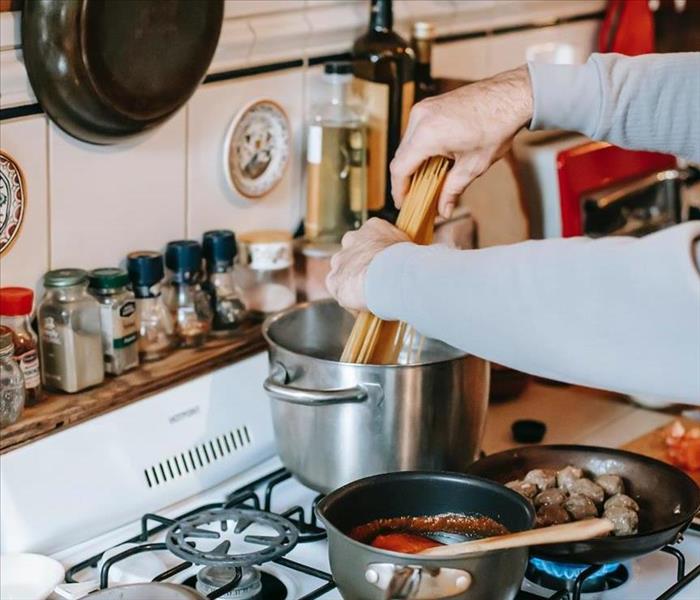 Prioritizing safety is paramount, particularly concerning potential fire hazards.
Prioritizing safety is paramount, particularly concerning potential fire hazards.
Indulge in the enticing fragrance of roasted turkey, the comforting warmth of pumpkin pie, and the joyous gathering of loved ones that collectively craft a festive atmosphere. Amidst the revelry, it is imperative to prioritize safety, particularly concerning potential fire hazards. Explore Thanksgiving fire safety tips to safeguard your holiday, ensuring it remains a time of gratitude and joy.
Kitchen Safety: The epicenter of Thanksgiving is undeniably the kitchen, where the enchantment of the feast unfolds.
- Never leave the stove unattended, especially during oil-based or frying activities.
- Keep flammable items, such as kitchen towels and oven mitts, away from the stovetop.
- Verify the proper functioning of smoke alarms and have a readily accessible fire extinguisher.
Turkey Fryer Safety: Deep-frying turkeys has evolved into a popular Thanksgiving tradition, accompanied by inherent risks.
- Set up the fryer outdoors, maintaining a safe distance from the house, deck, or any flammable materials.
- Thoroughly thaw the turkey before frying to prevent oil splatters.
- Monitor the oil temperature closely and avoid overfilling the fryer.
- Candle Caution: While candles contribute to a warm and cozy ambiance at your Thanksgiving dinner, they also pose a fire risk.
- Keep candles away from flammable decorations and other items.
- Place candles in stable, non-tip candle holders.
- Never leave lit candles unattended; extinguish them before leaving the room.
Electrical Safety: Thanksgiving often involves a plethora of electrical appliances and devices.
- Avoid overloading electrical outlets and use surge protectors when necessary.
- Inspect cords for frays or damage, replacing them as needed.
- Turn off appliances when not in use, and if possible, unplug them.
- Keep an Eye on Children: While children enhance the festive spirit, their curiosity can lead to unawareness of potential dangers.
- Designate a kid-free zone in the kitchen.
- Educate children about fire safety and stress the importance of staying away from hot surfaces.
- Assign a responsible adult to supervise young children during festivities.
Prioritizing safety is paramount, particularly concerning potential fire hazards. SERVPRO Of Norwood West Roxbury is The #1 Choice in Cleanup and Restoration for residential and commercial buildings’ fire damage. Call us today at (781) 769-9125
Protecting Your Home: A Comprehensive Guide to Fire Prevention
10/4/2023 (Permalink)
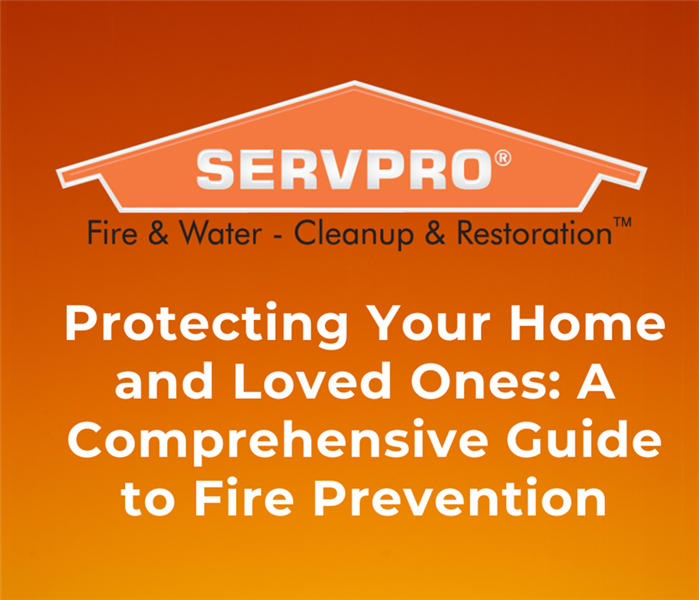 Stay safe, and prepared, and prevent fires to your home in Dedham, MA.
Stay safe, and prepared, and prevent fires to your home in Dedham, MA.
Many fires can be prevented with proper awareness, precautions, and responsible behavior.
Here are essential tips and strategies for fire prevention.
- Install Smoke Alarms: Ensure you have smoke alarms installed in key areas like bedrooms, hallways, and the kitchen. Regularly test them to make sure they are working correctly and replace their batteries at least once a year.
- Create a Fire Escape Plan: Make sure everyone in your household knows the plan, including multiple escape routes, a designated meeting point outside, and how to call 911. Practice fire drills regularly to ensure everyone is familiar with the process.
- Fire-Resistant Building Materials: If you're building a new home or renovating, consider using fire-resistant materials like fire-resistant roofing, siding, and insulation. These materials can slow the spread of flames and increase the chances of containing a fire until help arrives.
- Properly Store Flammable Materials: Store flammable materials, such as gasoline, propane, and paints, in a well-ventilated area away from heat sources and open flames. Use appropriate containers and follow safety guidelines to prevent leaks or spills.
- Maintain Heating Equipment: Heating equipment, including fireplaces, wood stoves, and furnaces, should be regularly inspected and maintained by professionals. Keep flammable materials at a safe distance and use protective barriers like screens to prevent sparks from escaping.
- Safe Cooking Practices: Never leave the kitchen unattended while cooking, and keep flammable objects like dish towels and curtains away from the stove. Install a fire extinguisher in or near the kitchen and know how to use it.
- Electrical Safety: Faulty electrical systems or appliances can trigger fires. Inspect electrical cords and outlets for damage and replace them if necessary. Avoid overloading electrical outlets and use surge protectors when needed.
- Candle Safety: Keep candles away from flammable materials and never leave them unattended. Consider using flameless LED candles as a safer alternative.
- Smoking Safety: If you smoke, do so outside and use a sturdy, deep ashtray. Ensure cigarettes are completely extinguished before disposing of them. Never smoke in bed, as falling asleep with a lit cigarette can lead to a deadly fire.
- Teach Fire Safety to Children: Children should be educated about fire safety from a young age. Teach them about the dangers of fire, how to respond in case of a fire, and the importance of not playing with matches or lighters.
Preventing fires is a shared responsibility that requires diligence and awareness. By following these fire prevention tips and fostering a culture of safety in your household, you can significantly reduce the risk of fires and protect your home and loved ones from this destructive force in Norwood West Roxbury. Remember, when it comes to fire prevention, an ounce of prevention is worth a pound of cure. Stay safe, and prepared, and prevent fires to your home in Dedham, MA.
SERVPRO® Of Norwood West Roxbury is The #1 Choice in Cleanup and Restoration for residential and commercial buildings’ fire, mold, water, and storm damage. Call us today at (781) 769-9125
5 Things Not to Do After a Fire Damages Your Home in Norwood West Roxbury, MA.
8/6/2023 (Permalink)
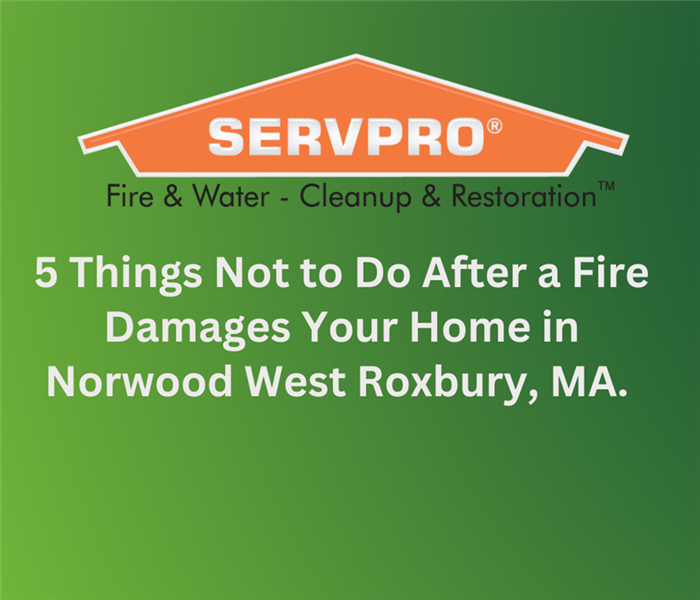 After the fire is extinguished and the immediate danger is over, it's essential to approach the situation with caution and a clear plan.
After the fire is extinguished and the immediate danger is over, it's essential to approach the situation with caution and a clear plan.
Experiencing a house fire is a devastating event that can leave you feeling overwhelmed and uncertain about what steps to take next. After the fire is extinguished and the immediate danger is over, it's essential to approach the situation with caution and a clear plan. While the desire to start restoring your home may be strong, there are several critical mistakes you should avoid to ensure a smoother recovery process.
- Entering the Property Without Proper Clearance: After a fire, your instinct may be to rush back into your home to assess the damage and retrieve valuables. However, entering the property without proper clearance from the fire department or relevant authorities can be extremely dangerous. Structural instability, hidden pockets of fire, toxic fumes, and weakened support beams are just a few of the hazards that might be present. Always wait for the official go-ahead before reentering your home to ensure your safety and that of emergency responders.
- Attempting DIY Repairs: Restoring your home after a fire requires professional expertise due to the complexity of the damage. While it's natural to want to start cleaning up immediately, attempting DIY repairs without the necessary knowledge and equipment can lead to further damage and compromise the integrity of your home. Instead, consult with licensed contractors or restoration specialists experienced in fire damage recovery. They will have the expertise and tools needed to assess the situation correctly and carry out safe and effective restoration work.
- Ignoring Smoke and Soot Damage: The aftermath of a fire often leaves behind extensive smoke and soot damage that may not be immediately apparent. Ignoring these lingering issues can lead to long-term problems, including health hazards and deterioration of materials. Smoke and soot particles can seep into walls, upholstery, and ventilation systems, causing respiratory issues and unpleasant odors. Engage professional cleaning services equipped to handle fire-related residues to ensure that your home is thoroughly cleaned and deodorized.
- Failing to Notify Your Insurance Company Promptly: Your homeowner's insurance policy is there to help you during such challenging times, but to maximize your claim and coverage, it's crucial to notify your insurance company promptly. Delaying the reporting of the fire or providing incomplete information may lead to complications and delays in receiving the necessary funds for the restoration process. Reach out to your insurance provider as soon as possible, providing detailed documentation of the damage and any valuable items that were lost.
- Disposing of Damaged Items Prematurely: Amidst the chaos of a fire-damaged home, it's tempting to discard ruined items quickly. However, it's essential to document the damage thoroughly before disposing of anything. Take photographs and make a detailed inventory of damaged belongings as evidence for your insurance claim. Your insurance adjuster may need this information to process your claim accurately. Moreover, some items may be salvageable through professional restoration services, potentially saving you money in replacement costs.
Experiencing a fire and the aftermath of its damage is an emotional and challenging ordeal. While the desire to start rebuilding your life is natural, it's essential to approach the recovery process cautiously and avoid certain mistakes. Remember not to enter your property until it's deemed safe, enlist the help of professionals for restoration work, promptly inform your insurance company, and document the damage thoroughly.
When it comes to cleanup and restoration services for fire, mold, water, and storm damage in both residential and commercial buildings, SERVPRO of Norwood West Roxbury proudly holds the top position as the number one choice. Our services extend to various areas, including Dedham, East Dedham, Endicott, Medfield, Norwood Centre, Norwood, Walpole, MA, and Westwood, MA. Trust us to provide unparalleled expertise and dedication to bring your property back to its original condition
How to Deal with Fire and Smoke Damage in a Home or Business in Norwood West Roxbury.
6/7/2023 (Permalink)
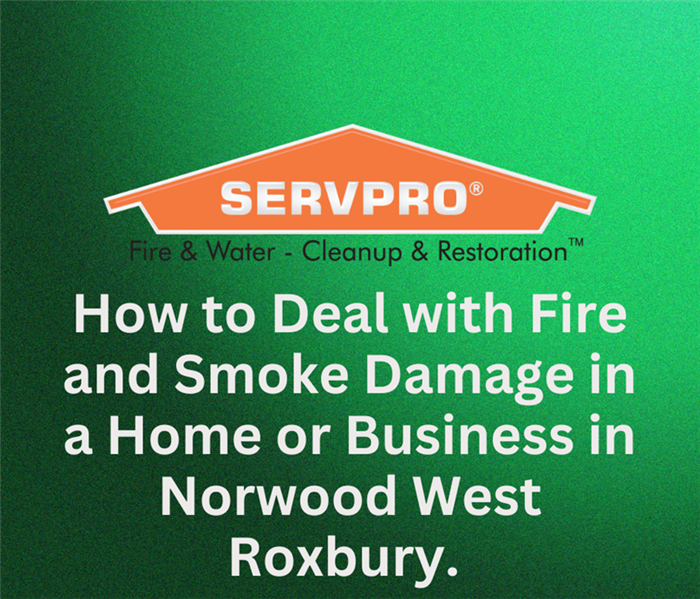 The aftermath of fire and smoke damage can present significant challenges. Here are steps to help you navigate the recovery process successfully.
The aftermath of fire and smoke damage can present significant challenges. Here are steps to help you navigate the recovery process successfully.
A fire incident in your home or business can be a traumatic event. The aftermath of fire and smoke damage can present significant challenges. Here are steps to help you navigate the recovery process successfully.
- Ensure Safety: It is crucial to wait for approval from the fire department or relevant authorities that the building is structurally safe. Wear appropriate protective gear, including masks, gloves, and eye protection, as smoke residues can contain harmful particles.
- Contact Professionals: Once the property is deemed safe to enter, contact a reputable fire damage restoration company as soon as possible, such as SERVPRO Of Norwood West Roxbury. We have the expertise, experience, and specialized equipment to handle fire and smoke damage effectively. We will assess the extent of the damage, provide guidance, and develop a comprehensive restoration plan tailored to your specific situation.
- Document the Damage: Before any cleanup or repairs take place, document the damage thoroughly. Take photographs and make a detailed inventory of all affected items and structural damage.
- Ventilate the Area: Open windows and doors to allow fresh air to circulate throughout the space. This helps to dissipate residual smoke and reduce odors. However, exercise caution if there is significant structural damage, as opening windows or doors could pose safety risks.
- Clean and Remove Soot: Soot and smoke residues can cause significant damage if left untreated. Begin by vacuuming loose soot particles using a high-efficiency particulate air (HEPA) vacuum cleaner. Avoid using regular household vacuums, as they may blow soot particles back into the air. Consider SERVPRO Of Norwood West Roxbury for thorough cleaning and restoration of delicate items such as textiles, electronics, and artwork.
- Assess and Repair Structural Damage: Evaluate the structural integrity of your property and address any immediate concerns. Seek assistance from a licensed contractor or structural engineer to determine the extent of the damage and develop a plan for repairs or rebuilding.
- Eliminate Odors: Begin by airing out the space and using fans or dehumidifiers to promote air circulation. Deep clean carpets, upholstery, and curtains to eliminate embedded smoke particles.
Remember to remain patient and resilient throughout the recovery process, as restoring your property to its preloss condition may take time.
SERVPRO Of Norwood West Roxbury is The #1 Choice in Cleanup and Restoration for residential and commercial buildings’ fire, mold, water, and storm damage. We service Dedham, East Dedham, Endicott, Medfield, Norwood Centre, Norwood, Walpole, MA, and Westwood, MA
What Should You Do If A Grill Is On Fire?
5/16/2023 (Permalink)
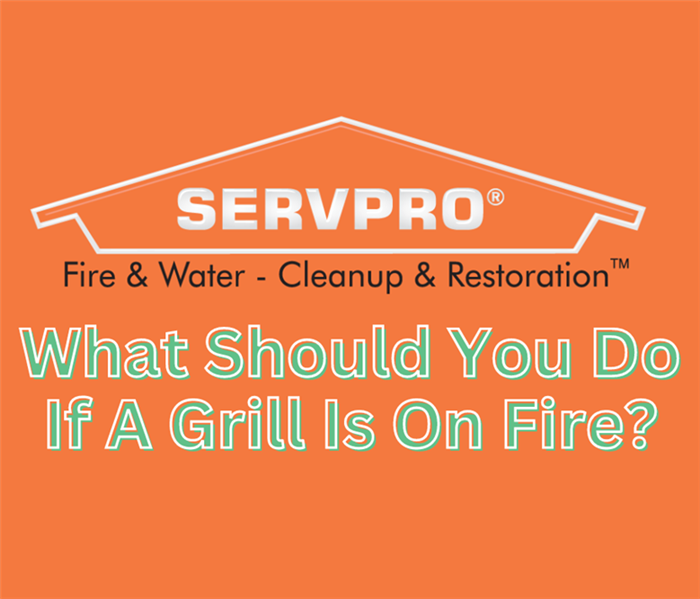 One of the most common safety hazards when grilling is a fire breaking out.
One of the most common safety hazards when grilling is a fire breaking out.
Grilling is a great way to enjoy delicious food and spend time outdoors with friends and family. One of the most common safety hazards when grilling is a fire breaking out. Here are the steps to take if a grill is on fire:
- Turn off the burners: If the fire is contained in one area of the grill, turn off the burners in that area. This will help prevent the fire from spreading.
- Close the lid: If the fire is larger and cannot be contained to one area, close the lid of the grill. This will help cut off the oxygen supply to the fire and reduce the flames.
- Disconnect the fuel source: If you are using a propane grill, turn off the propane tank and disconnect it from the grill. If you are using a charcoal grill, remove the charcoal from the grill.
- Use a fire extinguisher: If the fire is still burning, use a fire extinguisher to put it out. Make sure you use the correct type of fire extinguisher for the type of fire you are dealing with. For grill fires, use a Class B fire extinguisher, which is designed for flammable liquids and gases.
- Call for help: If the fire is too large to be put out with a fire extinguisher, call the fire department immediately.
- Do not use water: Never use water to put out a grease fire on a grill. This can cause the fire to spread and create a dangerous situation.
- Wait before cleaning: After the fire has been put out, wait until the grill has cooled down before cleaning it. This will prevent any remaining grease or debris from reigniting.
Remember to always be mindful of grill safety and take the necessary precautions to prevent accidents from happening.
SERVPRO Of Norwood West Roxbury is The #1 Choice in Cleanup and Restoration for residential and commercial buildings’ fire, mold, water, and storm damage.
We service Blackstone, Hopedale, Mendon, Milford, Natick, North Natick, and South Natick MA.
What Causes Microwave Fires?
5/4/2023 (Permalink)
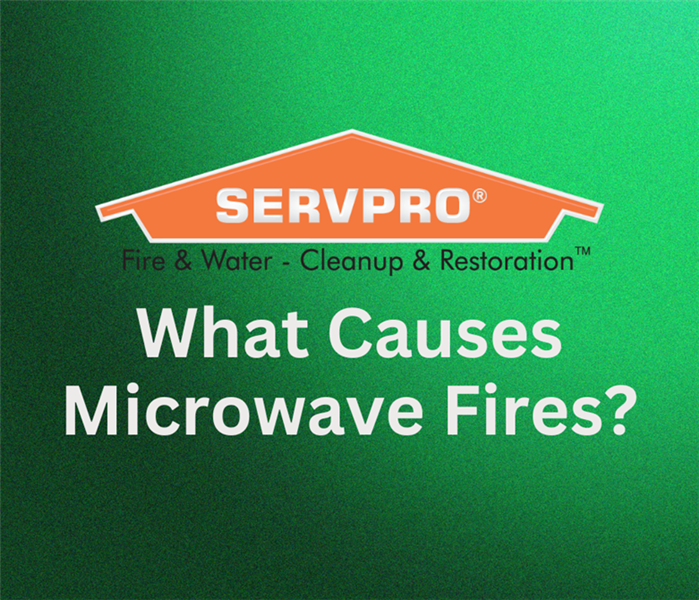 Microwave fires can be dangerous and should be avoided at all costs.
Microwave fires can be dangerous and should be avoided at all costs.
Microwaves have become an essential part of modern kitchens, allowing us to quickly heat up food and beverages. Microwaves can pose safety hazards if not used correctly. One of the most dangerous risks associated with microwaves is the possibility of a fire.
Microwave-safe containers are designed to withstand the high heat generated by the microwave, while other containers may melt, warp, or even catch fire. Common materials that are not suitable for microwaving include aluminum foil, metal, plastic containers that are not labeled as microwave-safe, and dishes with metallic or gold paint. When using a microwave, it is crucial to ensure that the containers and dishes you use are labeled as microwave-safe.
Another factor that can cause microwave fires is the buildup of grease or food residue inside the appliance. When food particles accumulate on the walls or ceiling of the microwave, they can overheat and catch fire. It is essential to clean your microwave regularly, especially after cooking greasy or fatty foods.
Overheating food can also lead to microwave fires. When food is cooked for too long, or if the microwave's power settings are set too high, the food can overheat and ignite. It is vital to follow the cooking instructions carefully and to stop cooking the food once it has reached the recommended temperature. Additionally, never leave your microwave unattended while cooking, as this can lead to overheating and potential fire hazards.
A faulty or malfunctioning microwave can also cause fires. If your microwave is making unusual noises, sparks, or emits smoke, it is essential to stop using it immediately and have it inspected by a professional. Do not attempt to repair the appliance yourself, as this can be dangerous.
Microwave fires can be dangerous and should be avoided at all costs. To prevent microwave fires, use only microwave-safe containers, keep your microwave clean, do not overheat food, and have any malfunctioning microwave inspected by a professional. By following these safety tips, you can enjoy the convenience of a microwave without putting yourself or your home at risk.
SERVPRO Of Norwood West Roxbury is The #1 Choice in Cleanup and Restoration for residential and commercial buildings’ fire, mold, water, and storm damage.
We service Blackstone, Hopedale, Mendon, Milford, Natick, North Natick, and South Natick MA.
Do you have a fire safety plan?
4/29/2023 (Permalink)
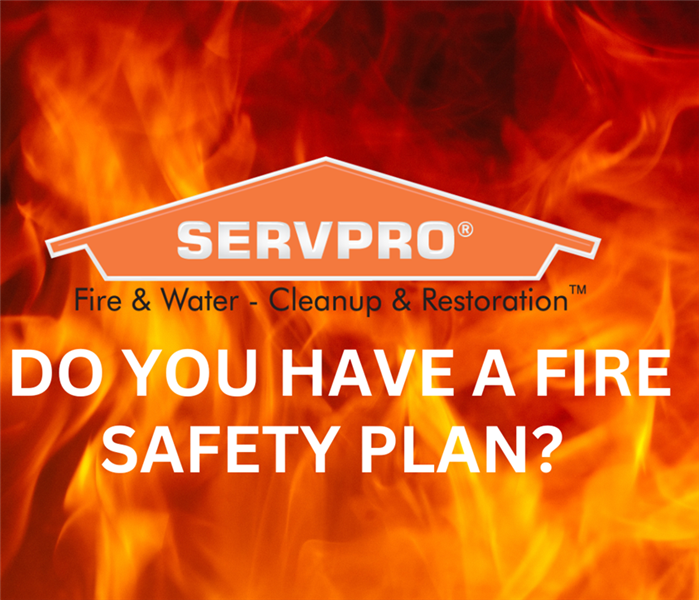 A fire safety plan is essential for keeping you and your loved ones safe in the event of a fire.
A fire safety plan is essential for keeping you and your loved ones safe in the event of a fire.
A fire safety plan is essential for keeping you and your loved ones safe in the event of a fire. Fires can happen suddenly and spread quickly, making it important to have a plan in place that everyone knows and can follow.
Why do you need a fire safety plan?
It can also help prevent injuries and property damage by ensuring that everyone knows what to do in the event of a fire. Having a plan in place can reduce panic and confusion during an emergency and increase the chances of everyone getting out safely.
How to create a fire safety plan
- Draw a floor plan: Start by drawing a floor plan for your home or workplace. Identify all exits, including doors and windows, and ensure they are easily accessible.
- Determine a meeting place: Choose a safe meeting place outside of your home or workplace where everyone can gather after evacuating. This could be a neighbor's house, a street corner, or a nearby park.
- Assign responsibilities: Assign responsibilities to each person in your household or workplace. This could include tasks such as calling 911, grabbing important documents or belongings, or assisting others in evacuating.
- Practice evacuation drills: Regularly practice evacuation drills with everyone in your household or workplace. This will help ensure that everyone knows what to do in the event of a fire and can evacuate safely and quickly.
- Install smoke detectors: Install smoke detectors on every level of your home or workplace and test them regularly to make sure they are working correctly. Replace the batteries at least once a year.
- Know how to use a fire extinguisher: Make sure that everyone in your household or workplace knows how to use a fire extinguisher and where it is located.
- Review and update the plan: Regularly review and update your fire safety plan to ensure that it is still relevant and effective. Make changes as necessary, such as adding new exits or changing responsibilities.
By creating a plan and regularly practicing evacuation drills, you can increase your chances of getting out safely and prevent injuries and property damage.
We service Dedham, East Dedham, Endicott, Medfield, Norwood Centre, Norwood, Walpole, MA, and Westwood, MA
SERVPRO Of Norwood West Roxbury is The #1 Choice in Cleanup and Restoration for residential and commercial buildings’ fire, mold, water, and storm damage.
Grill Fire Safety Tips
4/26/2023 (Permalink)
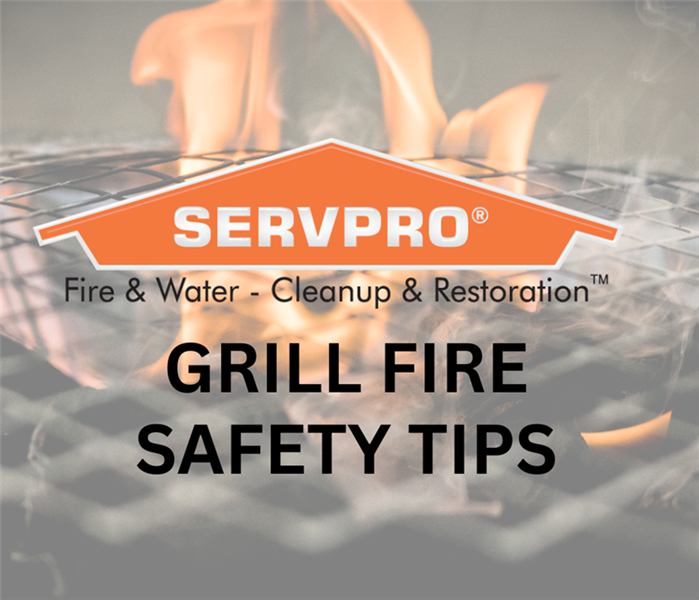 A grill fire can happen quickly and without warning, but there are steps you can take to prevent them from occurring.
A grill fire can happen quickly and without warning, but there are steps you can take to prevent them from occurring.
A grill fire can happen quickly and without warning, but there are steps you can take to prevent them from occurring.
Let’s discuss grill fire safety and tips to keep you and your family safe while enjoying your next cookout.
- Choose the right location for your grill: When choosing where to place your grill, ensure that it is at least 10 feet away from your home or any other combustible structures. Keep it away from overhanging branches, deck railings, and other potentially flammable objects.
- Clean your grill regularly: Cleaning your grill regularly can prevent grease buildup and reduce the risk of flare-ups. Grease fires can happen when grease and fat accumulate on the grates and drip pans. Make sure to clean your grill after every use, and occasionally deep clean it with a grill brush.
- Check for gas leaks: If you have a gas grill, make sure to check the hoses and connections for leaks before every use. A gas leak can cause an explosion or fire, so it's important to be vigilant.
- Keep a fire extinguisher nearby: In case of a fire, make sure to have a fire extinguisher nearby. Ensure that you know how to use it before you need it.
- Be mindful of what you're cooking: Some foods, like fatty meats or foods marinated in oil, are more likely to cause flare-ups. Be mindful of what you're cooking and how you're cooking it. Keep a close eye on the grill, and use a spray bottle of water to douse any small flames.
- Never leave the grill unattended: Never leave the grill unattended, especially if you have children or pets in the area. Accidents can happen quickly, and it's important to be present to address any issues that may arise.
- Shut off the grill properly: After you're finished cooking, make sure to shut off the grill properly. Turn off the burners and close the gas valve if you have a gas grill. For a charcoal grill, spread the coals out and let them cool down completely before disposing of them in a metal container.
Grilling can be an enjoyable activity, but it's important to prioritize safety to prevent a grill fire.
We service Dedham, East Dedham, Endicott, Medfield, Norwood Centre, Norwood, Walpole, MA, and Westwood, MA
SERVPRO Of Norwood West Roxbury is The #1 Choice in Cleanup and Restoration for residential and commercial buildings’ fire, mold, water, and storm damage.
Bonfire safety tips
4/26/2023 (Permalink)
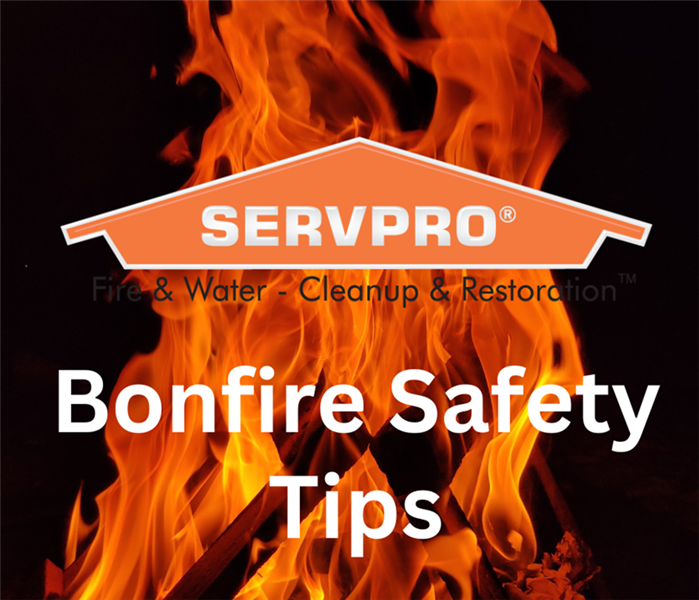 Bonfires can be a fun activity, but it's important to prioritize safety to prevent accidents or injuries.
Bonfires can be a fun activity, but it's important to prioritize safety to prevent accidents or injuries.
Bonfires are a popular outdoor activity. A bonfire can quickly turn into a dangerous situation if proper safety measures are not taken.
Here are bonfire safety tips to keep you and your loved ones safe:
- Choose the right location: When selecting the location for your bonfire, make sure to choose an area that is at least 25 feet away from any structures or combustible materials. This includes buildings, trees, bushes, and anything else that can easily catch fire. Also, ensure that the area is flat and level to prevent the fire from spreading.
- Clear the area around the bonfire: Before lighting the fire, clear the area around the bonfire of any debris, such as dry leaves, sticks, or branches. This will prevent sparks from igniting any nearby materials.
- Use an appropriate container: When building a bonfire, use a container that is made of metal or brick. This will prevent the fire from spreading beyond the container. Never use a container made of plastic, as it can melt and cause the fire to spread.
- Keep water or a fire extinguisher nearby: In case of an emergency, make sure to have a bucket of water or a fire extinguisher nearby. This will help you quickly extinguish the fire if it gets out of control.
- Don't use accelerants: Never use accelerants, such as gasoline or lighter fluid, to start a bonfire. This can cause an explosion or a sudden flare-up, which can be dangerous.
- Attend to the fire at all times: Never leave a bonfire unattended, especially if there are children or pets around. Assign a responsible person to monitor the fire at all times and make sure that it remains under control.
- Extinguish the fire properly: When you're done with the bonfire, make sure to extinguish the fire completely. Pour water over the fire and stir the ashes to ensure that there are no hot spots that could reignite the fire.
Bonfires can be a fun activity, but it's important to prioritize safety to prevent accidents or injuries.
We service Dedham, East Dedham, Endicott, Medfield, Norwood Centre, Norwood, Walpole, MA, and Westwood, MA
SERVPRO Of Norwood West Roxbury is The #1 Choice in Cleanup and Restoration for residential and commercial buildings’ fire, mold, water, and storm damage.
What should you do after a fire?
4/17/2023 (Permalink)
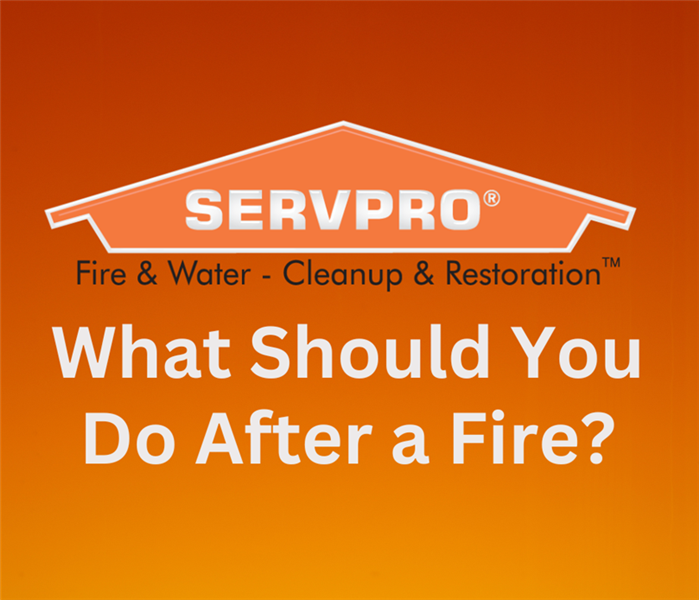 A fire can be a traumatic and devastating event. It's important to take immediate action to start the process of recovery
A fire can be a traumatic and devastating event. It's important to take immediate action to start the process of recovery
A fire can be a traumatic and devastating event. It's important to take immediate action to start the process of recovery and ensure the safety of your home and family.
Here are some steps you should take after a fire:
- Contact your insurance company: One of the first things you should do after a fire is to contact your insurance company. They can help you start the claims process and provide guidance on what steps to take next.
- Assess the damage: Once it is safe to do so, assess the damage to your home. Look for any visible damage, including structural damage, water damage, and smoke damage. Take photos of the damage to provide to your insurance company.
- Secure your property: If your home is severely damaged, you may need to board up windows and doors or cover damaged areas to prevent further damage from weather or vandalism.
- Contact restoration professionals: A professional restoration company can help you with the cleanup, salvage, and restoration of your home and belongings. They can also help you assess the extent of the damage and provide guidance on the best course of action.
- Salvage what you can: If it is safe to do so, try to salvage any belongings that were not damaged by the fire. You may be able to save some items with proper cleaning and restoration.
- Address smoke damage: Smoke can cause extensive damage to a home, even in areas not directly affected by the fire. Be sure to address smoke damage to prevent health hazards and further damage to your home.
- Ensure safety: Before returning to your home, ensure that it is safe to do so. Check for gas leaks, electrical hazards, and other safety concerns.
By contacting your insurance company, assessing the damage, securing your property, contacting restoration professionals, salvaging what you can, addressing smoke damage, and ensuring safety, you can begin to rebuild and move forward after a fire.
We service Dedham, East Dedham, Endicott, Medfield, Norwood Centre, Norwood, Walpole, MA, and Westwood, MA
SERVPRO Of Norwood West Roxbury is The #1 Choice in Cleanup and Restoration for residential and commercial buildings’ fire, mold, water, and storm damage.
What Are The Causes Of Fire?
2/15/2023 (Permalink)
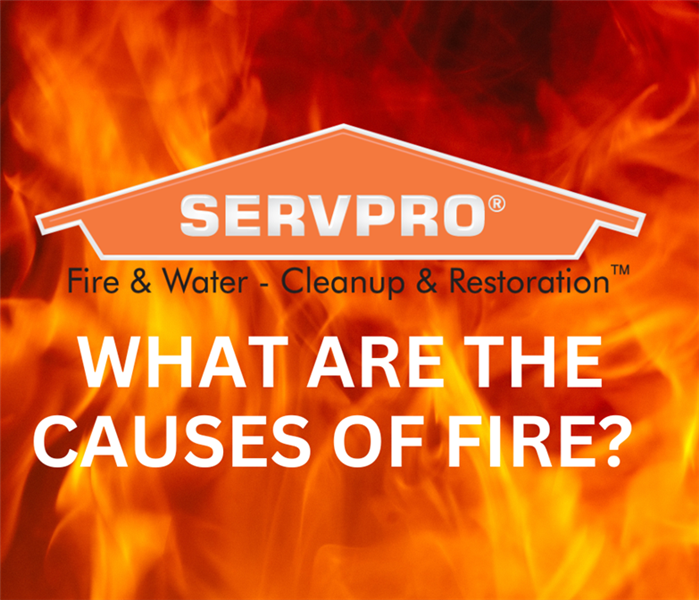 While fires can be difficult to prevent, there are many steps that can be taken to reduce the risk of fires and mitigate their impacts.
While fires can be difficult to prevent, there are many steps that can be taken to reduce the risk of fires and mitigate their impacts.
Fires are natural disaster that can occur in many different forms, from small brush fires to large-scale forest fires. They can happen at any time, and they can be devastating in terms of the damage they can cause to property, natural habitats, and human lives.
Causes of Fires
Fires can be caused by a wide range of factors, including natural causes such as lightning strikes, as well as human activities such as campfires, cooking, and smoking. In some cases, fires can also be caused by electrical faults or mechanical failures, such as faulty wiring or overheated equipment. In recent years, climate change has been identified as a major contributor to the increased incidence and severity of fires, as rising temperatures and changing weather patterns have created more favorable conditions for fires to occur.
Impacts of Fires
The impacts of fires can be far-reaching and long-lasting, affecting everything from the immediate safety of people and animals to the long-term health of ecosystems. In the short term, fires can cause injury and death to people and animals, as well as damage to property and infrastructure. In the long term, fires can have significant impacts on natural habitats, including loss of vegetation, changes in soil composition, and loss of biodiversity. Fires can also have a significant impact on the climate, releasing large amounts of carbon dioxide and other greenhouse gases into the atmosphere.
Prevention of Fires
Preventing fires requires a multi-faceted approach, including education, awareness, and proactive measures. This includes educating people about the risks and causes of fires, as well as providing information on how to prevent them. Some of the key preventative measures include regular maintenance of electrical equipment, avoiding open fires in high-risk areas, and ensuring that campfires are extinguished completely before leaving the site. Other important steps include monitoring weather conditions and fire danger ratings, as well as being prepared to evacuate in the event of an emergency.
While fires can be difficult to prevent, there are many steps that can be taken to reduce the risk of fires and mitigate their impacts. By working together and taking a proactive approach to fire prevention, we can help to protect our communities, natural habitats, and the planet as a whole.
SERVPRO of Norwood West Roxbury is your premier choice for fire damage and restoration. Our teams are ready to respond 24 hours a week, any day of the year. When you bring us on the job our team of licensed contractors and certified technicians will work collaboratively with you throughout the duration of the project. They will keep you updated on the project's status and ensure that your expectations are met. We will help you to move forward and make it “Like it never even happened” for all of your fire damage.
SERVPRO of Norwood West Roxbury: How to Deal with Fire in the Workplace: Tips and Strategies
2/5/2023 (Permalink)
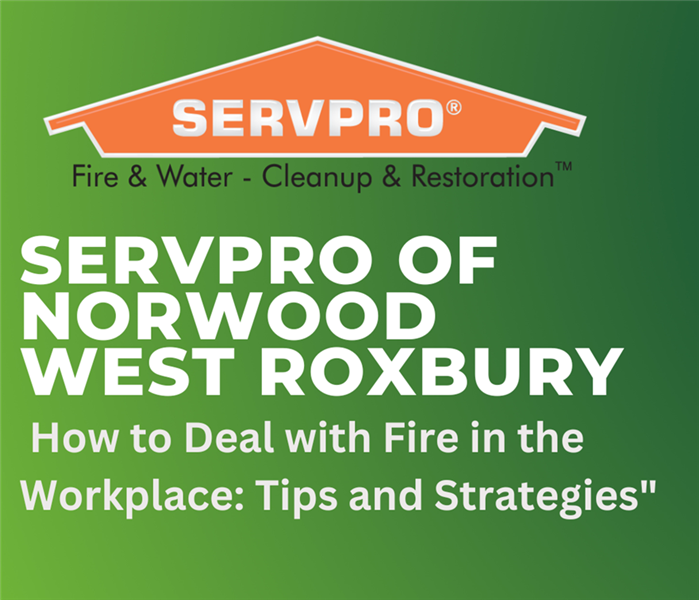 You can help prevent damage, minimize injury, and ensure the safety of everyone in your workplace in case of a fire.
You can help prevent damage, minimize injury, and ensure the safety of everyone in your workplace in case of a fire.
A fire can happen at any time and place. Having a fire response plan in place and understanding the proper procedures to follow can help prevent damage, minimize injury and ensure the safety of everyone in the workplace.
Here are some tips and strategies to help you deal with fire in your business:
- Establish a fire response plan: This should include the proper procedures to follow in case of a fire, such as evacuation procedures, and the designated meeting place for employees after evacuation.
- Install fire alarms and fire suppression systems: Fire alarms should be placed throughout the workplace, and fire suppression systems such as sprinklers should be installed to help put out the fire.
- Regularly inspect and maintain fire equipment: Regular inspections and maintenance of fire alarms, fire suppression systems and other fire equipment is essential to ensure they are functioning properly and can be used in the event of a fire.
- Conduct regular fire drills: Regular fire drills are important to help employees understand what to do in the event of a fire, and to ensure that everyone is prepared.
- Store flammable materials properly: Flammable materials should be stored in fireproof cabinets, away from heat sources and potential sources of ignition.
- Train employees: Employees should be trained on the proper procedures to follow in case of a fire, including how to evacuate the building, how to use fire extinguishers, and how to report the fire.
- Have an emergency evacuation plan: An emergency evacuation plan should be in place and clearly communicated to all employees. This should include the designated meeting place for employees after evacuation.
By following these tips and strategies, you can help prevent damage, minimize injury, and ensure the safety of everyone in your workplace in case of a fire.
SERVPRO of Norwood West Roxbury is your premier choice for fire damage and restoration. Our teams are ready to respond 24 hours a week, any day of the year. When you bring us on the job our team of licensed contractors and certified technicians will work collaboratively with you throughout the duration of the project. They will keep you updated on the project's status and ensure that your expectations are met. We will help you to move forward and make it “Like it never even happened” for all of your fire damage.
The Do's and Don'ts of Minimizing Soot and Smoke Damages
2/1/2023 (Permalink)
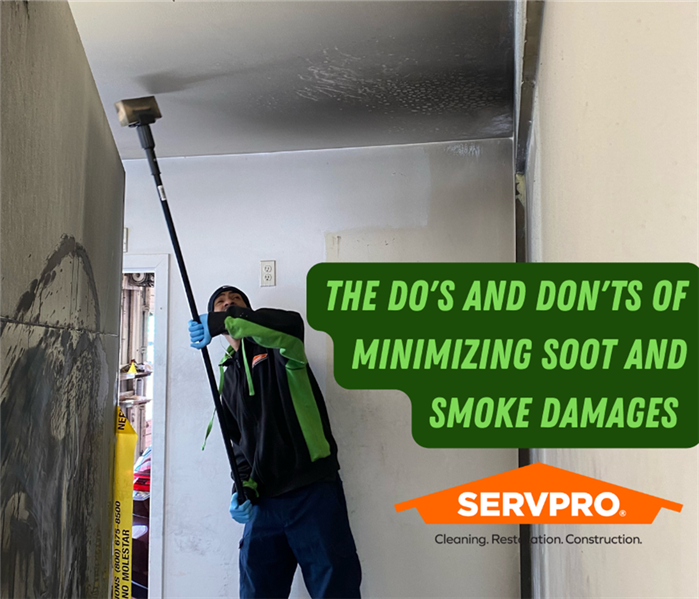 There are many ways to minimize the damage caused by soot and smoke.
There are many ways to minimize the damage caused by soot and smoke.
After experiencing fire damage, the soot and smoke damage which comes after can be difficult to restore. Knowing the best practices to remediate this damage is great information, but knowing how to prevent it is integral. Read information here on how to prevent damage from soot and smoke occurring.
DO:
- Limit movement in the home to prevent soot particles from being embedded into upholstery and carpets.
- Keep hands clean. Soot on hands can further soil upholstery, walls and woodwork.
- Brush vacuum loose soot particles from upholstery, drapes and carpet.
- Place clean towels or old linens on rugs, upholstery and carpet traffic areas.
- If electricity is off, empty freezer and refrigerator completely and prop doors open.
- Clean and protect chrome on kitchen and bathroom faucets, trim and appliances with light coating of Vaseline or oil.
- Wash house plants on both sides of leaves.
- Change HVAC filter.
- Tape double layers of cheesecloth over air registers.
DON’T:
- Don't attempt to wash any walls or painted surfaces or shampoo carpet or upholstery without contacting SERVPRO of Mobile County.
- Don't attempt to clean any electrical appliances, TV sets, radios, etc. that may have been close to fire, heat or water without first consulting an authorized repair service.
- Don't use any canned or packaged food or beverages that may have been stored near the fire, heat or water. They may have been contaminated.
- Don't turn on ceiling fixtures if ceiling is wet. The wiring may be damaged.
- Don't send garments to an ordinary dry cleaner. Improper cleaning may set smoke odor.
Even if your property didn’t suffer fire damage, there may be soot particles and residues left to clean up. If cleaned improperly, the odor and effects can linger long after the fire has been extinguished. From the structure itself to the contents inside SERVPRO of Norwood/West Roxbury utilizes the latest technology and training to make it "Like it never even happened." Contact us at (781) 769-9125
SERVPRO of Norwood West Roxbury Shares The Most Frequently Asked Questions About Fire Damage and Restoration
1/7/2023 (Permalink)
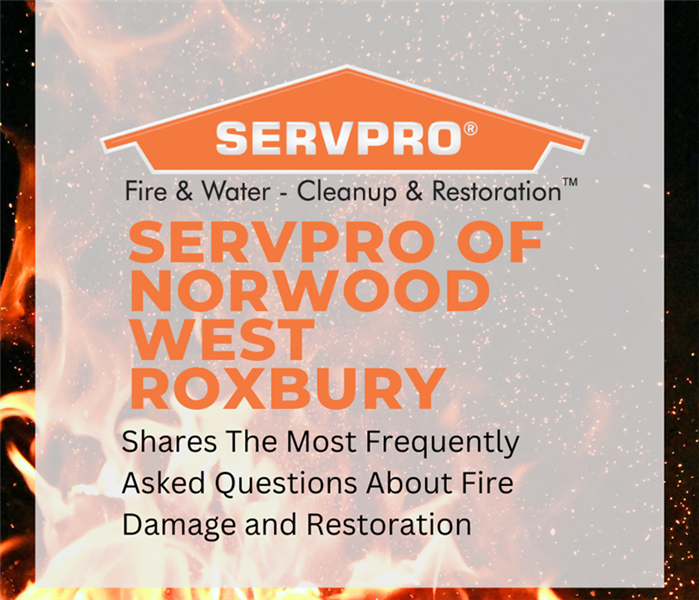 SERVPRO of Norwood West Roxbury is your premier choice for fire damage and restoration.
SERVPRO of Norwood West Roxbury is your premier choice for fire damage and restoration.
Surviving a fire can be a traumatic. After the flames have been put out and the smoke has cleared, it’s time to begin restoring your property.
We are sharing some of the top questions when it comes to fire damage.
- What Is the First Thing I Should Do After a Fire?: After the firefighters have put out the flames, it is a wise decision to call a fire damage restoration company immediately to begin the repairs.
- Can I Inspect My Home After a Fire?: No, you will want stay out of your property following a fire. Homes affected by a blaze are considered unstable and unsafe.
- How Do I Secure My Home After a Fire?: The damage restoration company can install board-ups and tarp covers to protect your home.
- If the Fire Damage Is Minor, Can I Clean It Myself?: No, this can put you and your loved ones in danger. Exposure to smoke and soot from fires can cause breathing difficulties.
- What Should I Do With the Water Used To Extinguish the Fire?: The fire damage repair team can extract the standing water using equipment such as sumps or extraction tools.
- Can Smoke Damage Be Removed? Smoke and soot damage on floors, walls, ceilings, and other surfaces might be tough to deal with, but they can be removed.
- Do I Need To Move Out During the Restoration Process? Yes, living in a fire-damaged home can be more stressful and unsafe.
- How Long Does Fire Damage Restoration Take?: The timeline for fire damage restoration project varies depending on the scope and severity of the damage.
SERVPRO of Norwood West Roxbury is your premier choice for fire damage and restoration. Our teams are ready to respond 24 hours a week, any day of the year. When you bring us on the job our team of licensed contractors and certified technicians will work collaboratively with you throughout the duration of the project. They will keep you updated on the project's status and ensure that your expectations are met. We will help you to move forward and make it “Like it never even happened” for all of your fire damage.
SERVPRO of Norwood West Roxbury Holiday Safety Advice
12/4/2022 (Permalink)
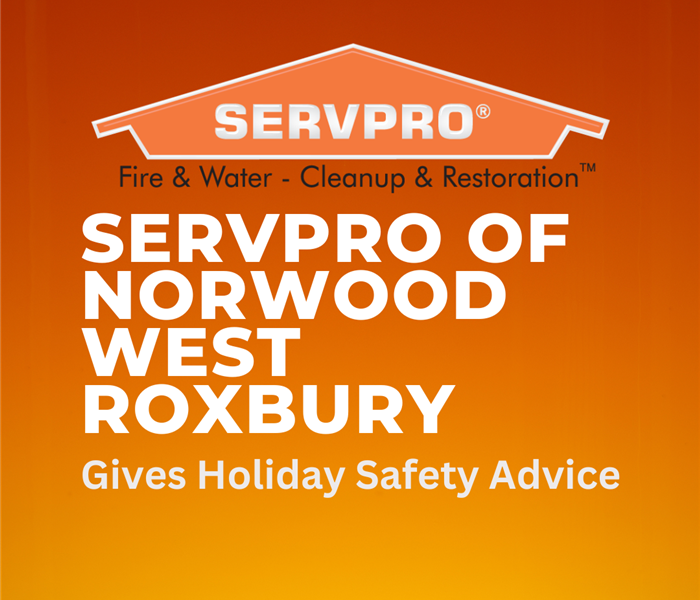 With proper Christmas lights preparation and safe practices, you can avoid those dangerous situations while decorating.
With proper Christmas lights preparation and safe practices, you can avoid those dangerous situations while decorating.
It is everyone’s favorite time of the year! With Christmas, there can be more fires than normal. Christmas lights make the holiday season bright; we decorate trees and homes with lights.
These decorations can have a risk though and electrocution is possible. With proper preparation and safe practices, you can avoid those dangerous situations while decorating.
Here are the safety tips you need to know.
- A missing or broken bulb can lead to shocks or even fires.
- Replace any broken bulbs before you string up your home or tree.
- If you decorate your home's exterior, make sure to use a ladder that isn’t metal.
- Make sure to use lights that are labeled indoors for your indoor lights and ones labeled outdoors for your outdoor lights.
- Check to make sure your lights are labeled as waterproof, especially outdoors.
- Always use an extension cord that is rated for outdoor use.
- Keep your cords from sitting on the ground.
- Make sure your light cord and your extension cord stay out of puddles or snow.
- Keep your light strands off the ground.
- Don't make your lights a year-long attraction. Lights, including smart lights, should not be used for long terms.
- Leave cords out of doors and windows. The cord could become pinched. This can ruin the insulation around the wires and lead to a shock.
Should you experience a fire, call 911 immediately and call your local fire restoration company.
SERVPRO of Norwood West Roxbury is your premier choice for fire damage and restoration. Our teams are ready to respond 24 hours a week, any day of the year. When you bring us on the job our team of licensed contractors and certified technicians will work collaboratively with you throughout the duration of the project. They will keep you updated on the project's status and ensure that your expectations are met. We will help you to move forward and make it “Like it never even happened” for all of your fire damages.
SERVPRO of Norwood West Roxbury Talks About Campfire Safety
8/8/2022 (Permalink)
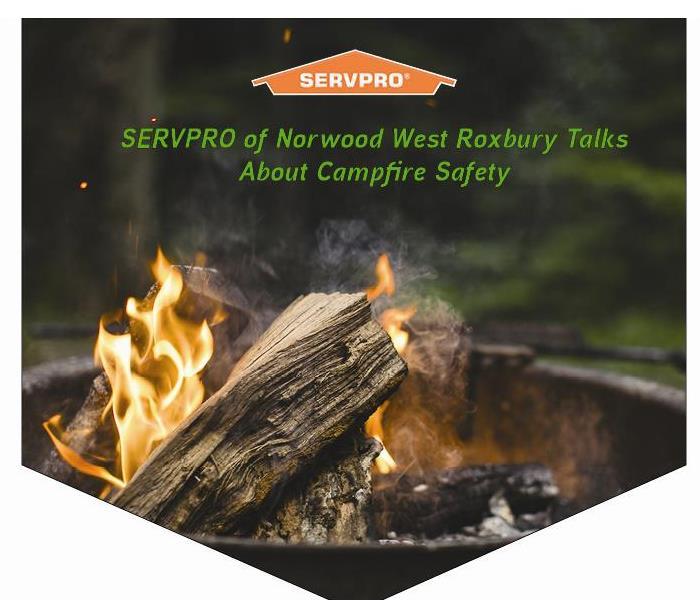 Enjoying a campfire is one of the most enjoyable parts of summer. A campfire that is not properly built, maintained, and extinguished can be dangerous
Enjoying a campfire is one of the most enjoyable parts of summer. A campfire that is not properly built, maintained, and extinguished can be dangerous
Enjoying a campfire is one of the most enjoyable parts of summer. A campfire that is not properly built, maintained, and extinguished can quickly become a hazard. It's important to understand how to safely enjoy your campfire.
- Know the rules: Before you strike a match, make sure you know the fire regulations of the campground or wilderness area.
- Use the pit: Most campgrounds provide a fire pit to build a campfire. If a pit is provided, this is the only place you should build a campfire. If not, dig a fire pit in an open area away from overhanging branches and power lines.
- Build a safe campfire: Start the fire with dried leaves or grass that will easily catch fire. Next, add small twigs and sticks that are less than an inch. As the fire builds, add the largest pieces of wood to the fire. This keeps the fire burning for a longer period of time.
Keep in mind that your fire does not have to be roaring. In fact, a small fire surrounded by rocks will do the job. Always make sure to take caution whenever you are creating a fire.
SERVPRO of Norwood West Roxbury is available 24/7 including holidays and weekends to assist you with your disaster needs to get it back to “Like it never even happened.”
SERVPRO of Norwood West Roxbury Shares How to Have a Safe Bonfire
5/13/2022 (Permalink)
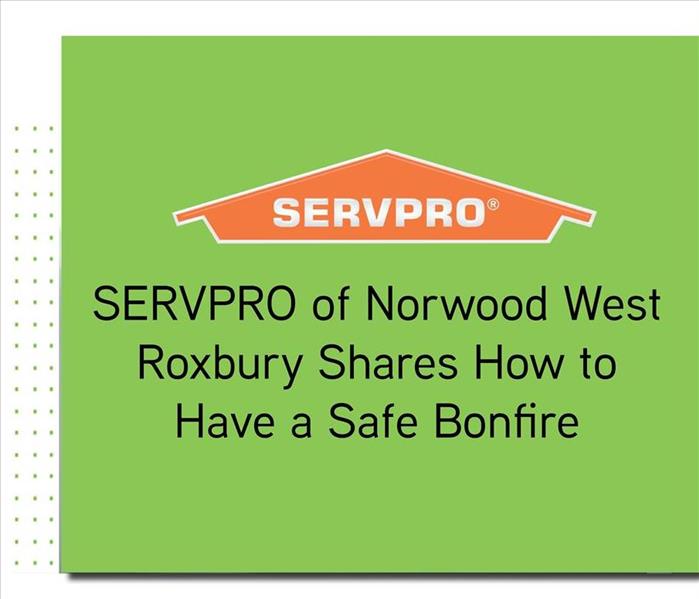 It is important to take precautions if you plan on having a bonfire.
It is important to take precautions if you plan on having a bonfire.
With the warmer weather comes much more outdoor fires such as a bonfire. This might sound like a fun idea, but it can also be dangerous and cause a bigger fire. It is important to take precautions if you plan on having a bonfire.
Here are some safety guidelines to follow:
- Never build a bonfire on a high-wind night.
- Keep a bucket of water or garden hose nearby
- Keep a close eye on the bonfire as well as anyone nearby the fire.
- Do not burn aerosols, canisters, or anything containing foam or paint.
- Ensure the wood you are burning is dry and seasoned.
- The pile shouldn't be bigger than 5' x 5'.
After the bonfire is done, turn over the materials with metal shovels and douse the area with water. Make sure to follow all fire and safety guidelines to ensure that a fire doesn't start.
SERVPRO of Norwood West Roxbury is available 24/7 including holidays and weekends to assist you with your disaster needs to get it back to “Like it never even happened.”
SERVPRO of Norwood West Roxbury Provides 5 Things You Should Never Burn in Your Outdoor Fire Pit
5/13/2022 (Permalink)
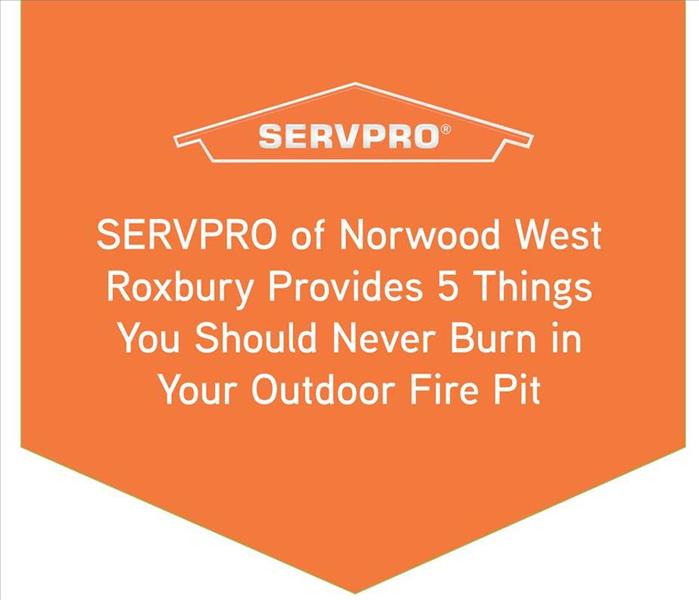 These are 5 things you should never burn in your outdoor fire pit.
These are 5 things you should never burn in your outdoor fire pit.
Having a fire pit is something that many enjoy throughout all seasons because it provides warmth when it is cold. However, there are some safety aspects that you should consider so that a larger fire isn’t created and damages anything additional.
These are 5 things you should never burn in your outdoor fire pit.
- Treated Wood
- Railroad Ties
- Plastic
- Yard Waste
- Garbage
Make sure that you are conscious about what you are burning. However, it might even pose a larger threat and cause damage to nearby items such as your home.
SERVPRO of Norwood West Roxbury is available 24/7 including holidays and weekends to assist you with your fire disaster needs to get it back to “Like it never even happened.”
SERVPRO of Norwood West Roxbury Is Your Fire Damage Experts
5/13/2022 (Permalink)
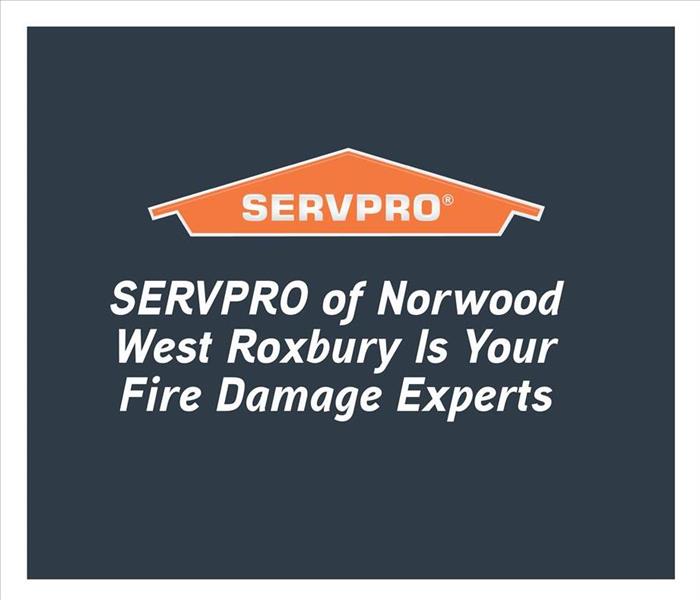 A fire disaster can cause damage to the structure of your home along with all the belongings; it can be stressful and devastating.
A fire disaster can cause damage to the structure of your home along with all the belongings; it can be stressful and devastating.
We hope that you never experience fire damage to your home. A fire disaster can cause damage to the structure of your home along with all the belongings; it can be stressful and devastating.
Here are some easy things you can do to reduce the risk of a fire.
- Make sure that you have working smoke alarms on all levels of your building. These will give you an early warning so you can get outside quickly.
- A closed-door may slow the spread of smoke, heat, and fire. Make sure that there are working smoke alarms in every sleeping room.
- Large homes may need extra smoke alarms.
- It is recommended to use interconnected smoke alarms.
- Test all smoke alarms at least once a month.
- A smoke alarm should be on the ceiling or high on a wall.
- Keep smoke alarms at least 10 feet from the kitchen stove to reduce false alarms.
- Replace all smoke alarms when they are 10 years old.
We know that you can’t always prevent a fire but these are helpful tips to reduce the risk.
SERVPRO of Norwood West Roxbury is available 24/7 including holidays and weekends to assist you with your fire disaster needs to get it back to “Like it never even happened.”
SERVPRO of Norwood West Roxbury Talks About Fire Damage
2/7/2022 (Permalink)
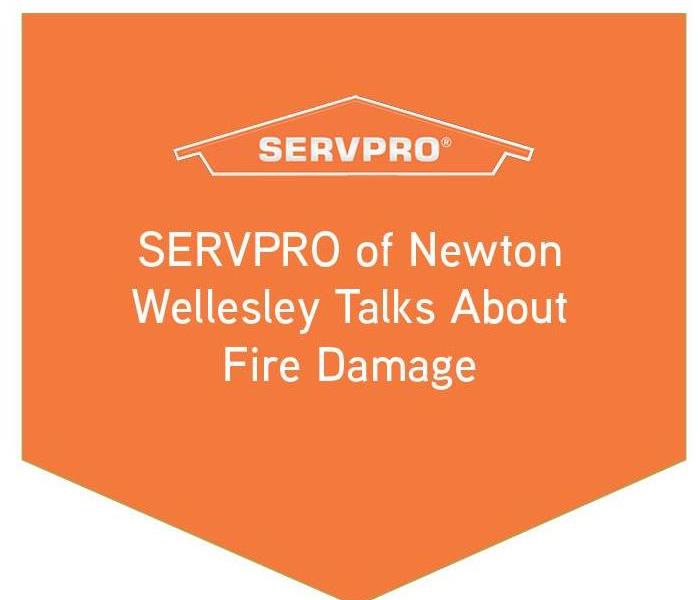 Homes have more electricity than ever before and can cause a fire if not properly addressed. Here are some tips to help prevent a fire
Homes have more electricity than ever before and can cause a fire if not properly addressed. Here are some tips to help prevent a fire
Homes have more electricity than ever before and can cause a fire if not properly addressed. Here are some tips to help prevent a fire:
- Check outlets for loose-fitting plugs.
- Don’t force plugs into outlets.
- Make sure cords are not frayed.
- Extension cords are for temporary use only.
- Use the correct light bulb wattage.
- Install Ground Fault Circuit Interrupters.
- Loose wires are common flashpoints for fires.
Fires are horrible disasters, it is important to know how to prevent one. At least once a month you should check on these items to ensure that everything is working properly and smoothly.
SERVPRO of Norwood West Roxbury is available 24/7 including holidays and weekends to assist you with your fire disaster needs to get it back to “Like it never even happened.”
SERVPRO of Norwood West Roxbury Shares The Top Reasons For Fires
2/7/2022 (Permalink)
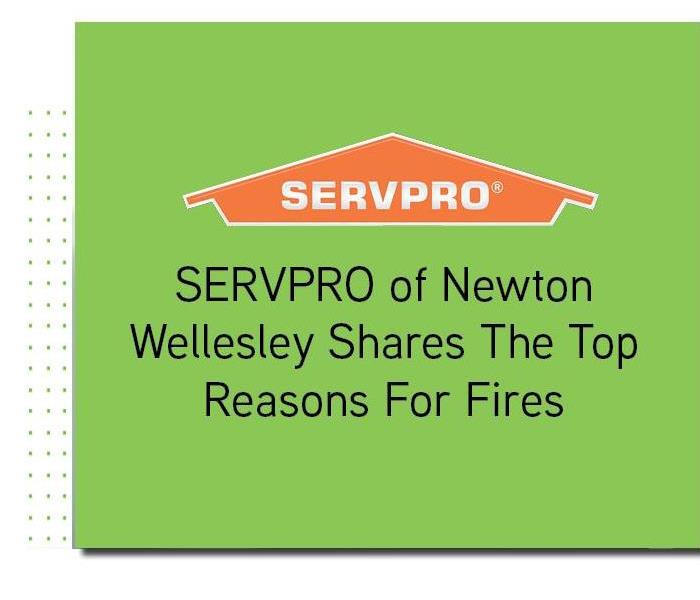 The key to fire prevention is knowing common causes, so you can help prevent them.
The key to fire prevention is knowing common causes, so you can help prevent them.
Fires are impossible to prevent, there are still some important factors to understand. The key to fire prevention is knowing common causes, so you can help prevent them.
Here are the top causes of fires:
- Cooking: Never leave a stove unattended.
- Smoking: An unattended burning cigarette can cause a serious fire.
- Heating: Space heaters are extremely flammable, make sure to use them properly.
- Electrical: A power cord can have your home in flames if there is damage to them.
- Candles: Always ensure all candles are blown out before leaving the room.
- Dryers: Remove the lint screen after every use in your dryer; this can cause a huge fire.
SERVPRO of Norwood West Roxbury is available 24/7 including holidays and weekends to assist you with your fire disaster needs to get it back to “Like it never even happened.”
SERVPRO of Norwood West Roxbury Shares Fire Extinguisher Use And Safety
2/7/2022 (Permalink)
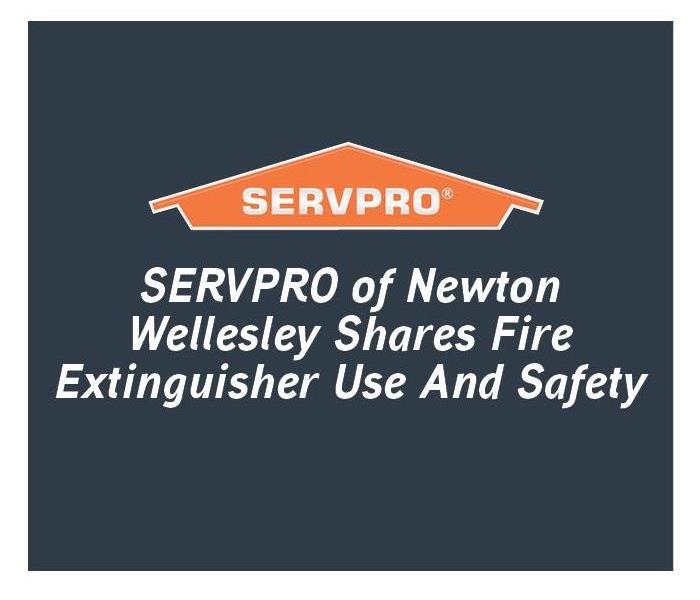 A portable fire extinguisher can be a saving tool for a fire. Here are some quick tips on how you can use a fire extinguisher correctly
A portable fire extinguisher can be a saving tool for a fire. Here are some quick tips on how you can use a fire extinguisher correctly
A portable fire extinguisher can be a saving tool for a fire. Here are some quick tips on how you can use a fire extinguisher correctly:
- Pull the pin and release the locking mechanism.
- Aim low, and point at the base of the fire.
- Squeeze the lever slowly.
- Sweep from side to side.
Make sure to read the instructions on the fire extinguisher. You will want to become familiar with it; it is important to encourage family members and coworkers to become familiar with it too.
Fire extinguishers can help put out a fire, however, make sure to seek professional assistance.
SERVPRO of Norwood West Roxbury is available 24/7 including holidays and weekends to assist you with your fire disaster needs to get it back to “Like it never even happened.”
Grease Fire Safety
11/2/2021 (Permalink)
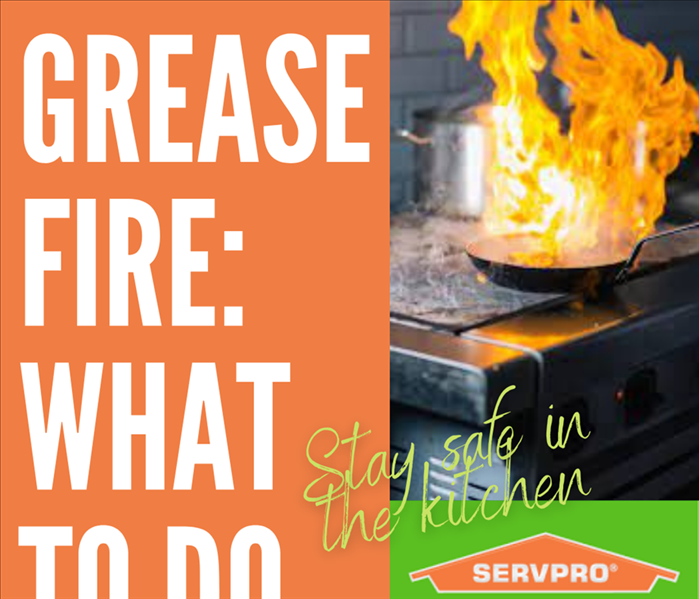 Know what to do before the instance so you can be prepared in case of emergency
Know what to do before the instance so you can be prepared in case of emergency
Grease fires can be incredibly dangerous when they begin. Follow these simple tips to keep your home safe from this event:PREVENTION:- Never leave the pot or pan unattended. This is the leading cause of grease fires.- Heat oil slowly- Add food slowly and gently to prevent oil splashing- Keep anything flammable away from the stovetop- Never put frozen food into hot grease- Always keep a metal pot lid on the counter to quickly smother a pan fireIF FIRE STARTS:- If fire has spread beyond the cooktop, call 911 and SERVPRO. It takes less then five minutes for a room to be engulfed in flames.- If fire is small, smother it with salt.- Use a Class K fire extinguisher as a last resort. This is a wet chemical extinguisher. SERVPRO of Norwood/West Roxbury is here for you, 24/7/365, to assist you and your home/commercial property in case disaster strikes. Keep our number in your emergency contacts: (781) 769-9125
Fire prevention tips for your business in Norwood West Roxbury
8/9/2021 (Permalink)
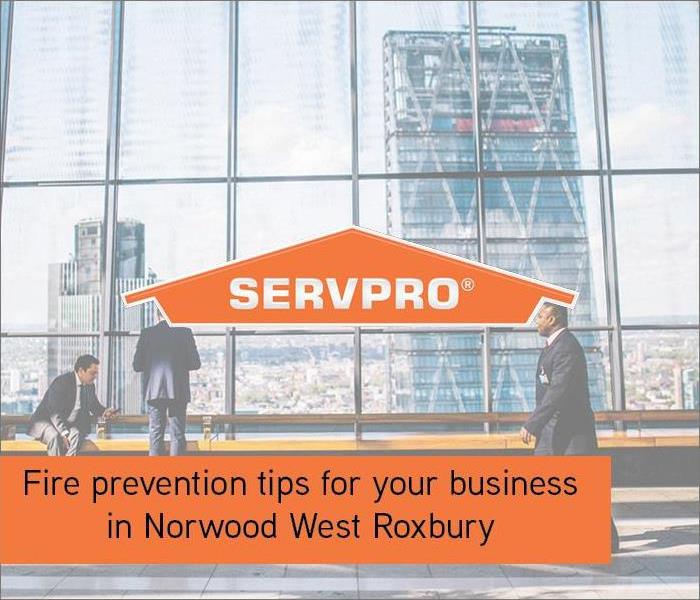 These are quick-fire tips should your business need them. If you are looking for help in creating an Emergency Readiness Plan, contact us today.
These are quick-fire tips should your business need them. If you are looking for help in creating an Emergency Readiness Plan, contact us today.
A fire can cause severe damage to business structures, equipment, and more. An owner should focus on fire risk assessment, fire prevention, and education of the staff to help reduce your chance of fire damage.
Here are three tips to consider:
1. Have fire protection equipment: Look into an automatic sprinkler system, this will provide primary fire protection for your business. Also, let employees be aware of the location of fire extinguishers throughout the building.
2. Fire safety in the workplace: Your employees are part of your team but they’re also essential assets to your business. Ensure that your employees know what to do if there's a fire.
3. Evacuation plan: Every business should post a fire evacuation plan in several spots around the workplace. In case of fire injuries, your staff should be familiar with the location of the first-aid kit.
These are quick-fire tips should your business need them. If you are looking for help in creating an Emergency Readiness Plan, contact us today for no cost.
SERVPRO of Norwood West Roxbury is available 24/7 including holidays and weekends to assist you to get your business back to “Like it never even happened.”
Avoid Fires This Summer Season
5/19/2021 (Permalink)
 We encourage summer fire safety in your community with these free tips.
We encourage summer fire safety in your community with these free tips.
Every year we look forward to summer vacations, camping, family reunions, picnics, and the holidays or celebrations. Summertime brings fires and injuries due to fireworks and outdoor cooking.
We encourage summer fire safety in your community with these free tips:
- Know how to prevent a burn while you enjoy outdoor activity this summer.
- Wear short sleeves or roll them up when cooking on the grill.
- Use long-handled barbecue tools
- Keep a 3-foot safe zone around grills, fire pits, and campfires.
- Attend public fireworks displays so it leaves the lighting to the professionals.
- Ensure children are not near fireworks, fires, or grill cooking without adult supervision.
- Propane and charcoal BBQ grills should be used outdoors only.
- Keep children and pets at least three feet from the grill area.
- Keep your grill clean by removing grease buildup.
- Never leave your grill unattended.
- Always make sure your gas grill lid is open before lighting it.
SERVPRO of Norwood West Roxbury is available 24/7 including holidays and weekends to assist you with your fire needs. Call (781) 769-9125
Summer Fire Safety
5/19/2021 (Permalink)
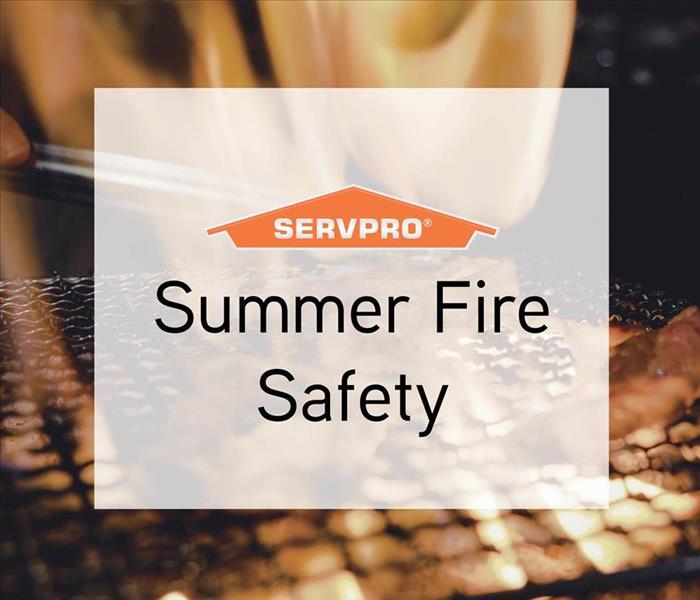 Now that the summer months are here, there are some things to remember so you are careful and don’t create any unnecessary fires.
Now that the summer months are here, there are some things to remember so you are careful and don’t create any unnecessary fires.
Now that the summer months are here, there are some things to remember so you are careful and don’t create any unnecessary fires:
- Grilling Safety: Make sure to regularly remove grease or fat buildup from the trays. Never leave a grill unattended.
- Lawn Mower Care Follow the manufacturer’s recommended maintenance plan for your mowing equipment. Make sure to remove debris and grass clippings from cutting units and engines.
- Gas Storage: Do not store gasoline, liquid fire starter, propane, or any other type of flammable liquids near a grill. Store any sort of flammable liquid in a well-ventilated area outdoors.
- HVAC Maintenance: Annual inspections of your air conditioner system can prevent a house fire. Dust can settle in places that can cause short circuits and other electrical malfunctions. This could lead to an air conditioning fire.
- Alarm Inspection: Make sure to check your smoke detectors and/or carbon monoxide detectors regularly; this is one of the best fire prevention methods.
SERVPRO of Norwood West Roxbury is available 24/7 including holidays and weekends to assist you with your fire needs. Call (781) 769-9125
Fire Alarms In Your Home
2/10/2021 (Permalink)
While you might assume that when you bought your home in Medfield, Ma that it came correctly installed fire alrams, this is not always the case. As more research has been conducted over the years on fires and how they spread, requirements have changed. Many older homes do not meet these standards which can be dangerous in the case a fire does occur. Keep your family safe by ensuring a fire alarm is located in the following four locations!
Bedrooms
The National Fire Protection Association suggests the placement of a fire alarm in every bedroom of the house. This ensures that if a fire occurs while your family is asleep, the alarms will wake quickly wake up everyone.
Outside Every Sleeping Area
Not only should alarms be inside every bedroom, there should be a smoke alarm right outside the room or any other sleeping areas as well. This is so you can react and start to escape before any fire or smoke even enters your room.
10 Feet From Your Kitchen
Kitchen fires result in approximately 50 percent of all home fires, many of which result in serious fire damage to your home. Make sure a fire alarm is located 10 feet from your kitchen rather than inside it since smoke or steam from cooking can easily trigger it.
Every Level of Your Home
Ensure that there is as least one smoke alarm on every level of your home. Don’t forget your basement! Serious fire and smoke damage can occur from an undetected fire that starts in the basement.
It doesn’t take long for a house fire to quickly get out of hand! That’s why it is so important to have fire alarms correctly installed in your home. A fire can happen at any time and when it does call the experts at SERVPRO of Norwood/West Roxbury at (781) 769-9125. We will make it, "Like it never even happened."
Removing Odor After A Fire
2/10/2021 (Permalink)
Smoke odors after a fire are persistent. Methods such as air filtration, ventilation, or wiping residue off of surfaces are not likely to be sufficient. Particles of smoke drift into air ducts, nooks and crannies, and porous materials such as carpeting, drapery, and furniture. The only way to completely eliminate smoke odor is to permanently neutralize the presence of these particles. Here are three methods we use to eliminate odor after a fire.
Ozone Machines
Ozone machines release molecules that follow the same path as smoke particles and oxidize these sources of odor. This method is popular because it works quickly, but all occupants, pets, and plants must be temporarily evacuated.
HVAC Air Scrubbers
These scrubbers connect to the central air system to circulate air and filter out smoke particles. As these systems do not neutralize odor molecules, a faint smoke odor may linger. Some odor mitigation professionals may combine an air scrubber with another smoke cleaning method.
Thermal Foggers
Thermal foggers fill a home with fog for approximately 30 minutes before the residence is ventilated and allowed to dry. This highly effective odor elimination method also calls for evacuation and workers must wear respirators.
When fire strikes your commercial or residential property fixing the damage is step one, eliminating the odor is step to. The Disaster Remediation Teams at SERVPRO of Norwood/West Roxbury are here to help with both! Call us at (781) 769-9125. We will make it, "Like it never even happened."
After A Fire You Need Professional Help
2/10/2021 (Permalink)
When fire strikes your Dedham, Ma commercial or residential property most owners think expect that there will be some sort of structural damage that needs to be fixed. What most do not consider is the need for professional cleaning to remove smoke and soot damage. Why should a property owner seek a professional?
There are two different types of smoke–wet and dry. As a result, there are different types of soot residue after a fire. Before restoration begins, SERVPRO of Norwood/West Roxbury will test the soot to determine which type of smoke damage occurred. The cleaning procedures will then be based on the information identified during pretesting.
Wet Smoke – Plastic & Rubber
Low heat, smoldering, pungent odor, sticky, smeary. Smoke webs are more difficult to clean.
Dry Smoke – Paper & Wood
Fast burning, high temperatures, heat rises therefore smoke rises.
Protein Fire Residue
Protein fire residue is produced by evaporation of materials, is virtually invisible, discolors paints and varnishes, and usually has an extreme pungent odor.
Since each smoke and fire damage situation is a little different, each one requires a unique solution tailored for the specific conditions. The Disaster Remediation Teams at SERVPRO of Norwood/West Roxbury are here to help! Call us at (781) 769-9125. We will make it, "Like it never even happened."
Fire Damage Causes Water Damage
8/12/2020 (Permalink)
Most people don’t think about it until a fire happens to them, but fire and water damage almost always go hand-in-hand. For this reason, it is necessary for fire restoration services to specialize in water clean-up too! Here are just a few ways fires can lead to water damage in your Norwood, MA commercial or residential property:
Fire Hose
For most commercial building owners, the primary cause of water issues following a fire comes from the tool used to douse the fire, the hose. Fire hoses emit gallons of water per minute at an extremely high pressure. Even if it does not take long for firefighters to extinguish a blaze, your building may sustain considerable water damage and property loss.
Burst Pipes
Some blazes become so hot that they begin to melt certain metals. If the fire in your building reaches the melting points of copper you will find yourself dealing with both fire and water damage.
Suppression Systems
Sprinkler systems will put out a fire. Unfortunately, they will cause water damage too. In some instances they may flood the property as well.
Clean Up
If your home has suffered fire damage call the fire AND water remediation experts at SERVPRO of Norwood/West Roxbury at (781) 769-9125. We will make it "Like it never even happened."
Practice Makes Perfect
4/29/2020 (Permalink)
A fire in your Dedham, MA home can start anywhere and at any time. Having an escape plan in place is a good way to make sure you and your family know what to do incase of a fire. Practicing the plan is just as important. At least twice a year, run through your plan, both at different during the day and night, and practice the different ways out.
- Check your smoke alarms: Test your smoke alarms each month so all family members know the sound. Make sure there’s a smoke alarm on every level of your home, and one in each bedroom.
- Know where to go: When the smoke alarm sounds, everyone must get out of the house quickly and go to your safe meeting place.
- Do the drill: Have kids head to their bedrooms and wait for the drill to begin. Assign adults to help children under 6. Put one adult in charge of sounding the smoke alarm and running the drill. Next, sound the smoke alarm, start the timer and have everyone hurry to the meeting spot. Once all are there, stop the timer. Did you escape and gather in less than two minutes? If not, keep practicing.
In a real fire, get to your safe meeting place, call 911 and keep everyone close until firefighters arrive!
If your home has suffered fire damage call the fire remediation experts at SERVPRO of Norwood/West Roxbury at (781) 769-9125. We will make it "Like it never even happened."
Document Restoration
2/13/2020 (Permalink)
When fire damages your Dedham, MA commercial or residential property not only will the structure need remediation but so will the contents. That includes documents such as financial statements, books and photos. These items are not always lost, we can help. Document Restoration is another service SERVPRO of Norwood West Roxbury can provide.
The SERVPRO® Document Restoration Facility Offers:
- Innovation: we use the latest vacuum freeze-drying method, as well as gamma irradiation technology for sterilizing
- Secure: managed by HIPPA Master-certified technicians, under 24/7 surveillance
- Digital: we use a computerized inventory system for digitizing your documents
- Flexible capacity - we can accommodate large commercial losses or small residential jobs
- Full Service: we offer a range of services including drying, cleaning/disinfecting, re-jacketing, digitizing, and deodorization
When your commercial or residential property suffers fire damage call the experts at SERVPRO Norwood West Roxbury, 781-769-9125. We will make it, "Like it never even happened."
Safety in the Home
4/26/2019 (Permalink)
Keep your family safe from fire. Be aware of the hazards in your home. And, be sure to have an escape plan. Pull together everyone in your household and make a plan. Walk through your home and inspect all possible exits and escape routes
Burn awareness Most “fire-related injuries” are burns. Make sure kids stay more than 3 feet away from the stove. Most “fire-related injuries” are burns. In fact, approximately every 60 seconds someone in the U.S. sustains a burn injury serious enough to require treatment.*
Dryers and washing machines The leading cause of home clothes dryer and washer fires is failure to clean them.
- Clothes dryers accounted for 92% of the fires; washing machines 4%, and washer and dryer combinations accounted for 5%.
- The leading factor contributing to the ignition of home fires involving clothes dryers was failure to clean, accounting for one-third (33%) of dryer fires.
- A mechanical or electrical failure or malfunction was involved in the vast majority of home fires involving washing machines.
- Fires involving clothes dryers usually started with the ignition of something that was being dried or was a byproduct (such as lint) of drying, while washing machine fires usually involved the ignition of some part of the appliance.
Escape planning Learn the steps to create and practice a home fire escape plan. Fire can spread rapidly through your home, leaving you as little as one or two minutes to escape safely once the smoke alarm sounds. A closed door may slow the spread of smoke, heat and fire. Install smoke alarms in every sleeping room and outside each separate sleeping area. Install alarms on every level of the home. Pull together everyone in your household and make a plan. Walk through your home and inspect all possible exits and escape routes. Households with children should consider drawing a floor plan of your home, marking two ways out of each room, including windows and doors.
Gasoline & propane safety Always handle gasoline in the home or propane-powered equipment cautiously. Handle any propane-powered equipment cautiously and always follow the manufacturer's instructions.
- Cylinder tanks for equipment such as stoves and ovens must be located outside of the home.
- Keep gasoline out of children's sight and reach. Children should never handle gasoline.
- If fire does start while handling gasoline, do not attempt to extinguish the fire or stop the flow of gasoline. Leave the area immediately, and call for help.
- Do not use or store gasoline near possible ignition sources (i.e., electrical devices, oil- or gas-fired appliances, or any other device that contains a pilot flame or a spark).
Hoarding and fire safety Many fire departments are experiencing serious fires, injuries, and deaths as the result of compulsive hoarding behavior. The excessive accumulation of materials in homes poses a significant threat to firefighters fighting fires and responding to other emergencies in these homes and to residents and neighbors.
Holiday Safety
12/11/2018 (Permalink)
According to the National Fire Protection Agency U.S. fire departments responded to an estimated annual average of 200 Christmas tree related home fires during the holiday season. In total, the average annual property damage is over $14 million dollars! While such fires are uncommon they are more likely to result in civilian death. A death occurs in 3% of reported Christmas tree fires. By comparison a fatality occurs in only ½% of all other reported home fires. The reason for this discrepancy, Christmas tree fires usually star overnight when trees are left lit. Remember to turn your tree lights off before going to bed and if your tree is natural make sure to water it regularly and dispose of it shortly after the holidays.
We at SERVPRO Norwood / West Roxbury wish you and yours a happy and safe holiday season!
Holiday Fire Hazards
12/11/2018 (Permalink)
The more holiday lights the better, right? Weather we are talking about strands of our favorite Christmas lights or holiday scented candles, one quarter of reported Christmas tree fires the result of electrical problems or heat sources too close to the tree (according to the NFPA). Be sure not to overload outlets with multiple strands of lights and make sure that the electrical wiring is up to current electrical code standards. Also, check the wiring to ensure that there are no frays or loose connections.
If candles are the way you light up your holidays then follow these two important safety tips. Do not leave candles lit when going to bed or if no one is home. Additionally, keep them a safe distance from anything flammable.
We at SERVPRO Norwood / West Roxbury wish you and yours a happy and safe holiday season!
How To Prevent A Dryer Fire
12/11/2018 (Permalink)
Very few people realize the danger of clothes dryer fires. However, according to the U.S. Consumer Product Safety Commission, there are an estimated annual 15,500 fires, 10 deaths and 10 injuries due to clothes dryer fires. Several hundred people a year are also subjected to carbon monoxide poisoning from improper dryer vent setups. The financial costs come to nearly $100,000,000 per year. In some cases faulty appliances are to blame, but many fires can be prevented with proper dryer venting. Lint accumulation and reduced airflow feed on each other to provide conditions ripe for a fire. Lint is a highly combustible material, which, interestingly enough, is one of the ingredients in a recipe for home-made fire starters. A number of dryer vent problems contribute to this.
Here are several important steps you can take to keep this from happening to you
Clean your lint screen.Always clean your lint screen right before you push the start button for EVERY LOAD! Even if there is just a small amount of lint on the screen, clean it anyway. This is a good habit to get into.
Check your vent hose.Make sure your vent hose is in good shape. If you have the white plastic vent hose, replace it now! It is not safe and has been outlawed. Use the aluminum type vent hose and make sure the length is as short as possible and not crushed or kinked.
Clean your vent line regularly.It's very important that the vent line (from the wall behind the dryer to the outside flap) is not restricted or clogged up with lint. This greatly increases your chance of a dryer fire. If you are unable to clean out this line yourself, call a professional. Many Chimney Sweep companies offer this service.
Keep the area around the dryer clean.In the event that your dryer does have a lint fire, don't give it more fuel to destroy your home. Make sure there are no articles of clothing, boxes, cleaning supplies, or anything else behind or around the dryer. You should also keep things off the top of the dryer.
Clean the lint out of the inside of the dryer regularly.Your dryer needs to be opened up and vacuumed out periodically. Most dryers today are not easily accessible for the homeowner. Unless you know how to take your dryer apart and put it back together, you'll need a technician to do this. Any time you have your dryer repaired, ask the technician to vacuum it out for you. He should be doing this anyway as part of the service.
Make sure your gas line is in good shape.If you have a gas dryer you should check your gas line. If it looks old or questionable, you should replace it. Make sure when you push your dryer back into position, you don't kink the line.
Chemicals Released During Fires
10/12/2018 (Permalink)
Some of the biggest issues associated with fire damage do not come directly from the flames. The heat and water vapor from combustion can cause severe damage. There is also the smoke and soot from the fire that can cause lasting problems to your home. They contain toxic chemicals and also have a smell that lasts.
Plastics and other synthetic materials can leave behind harmful chemicals that are dangerous to inhale. Wood smoke is usually the largest contributor to smoke in the building. It contains methane, carbon monoxide, benzene, sulfur dioxide, formaldehyde, formic acid, acetic acid, and traces of heavy metals. This combination of chemicals is quite hazardous and can cause major problems for anyone who inhales or comes in contact with the smoke or residue left behind. The smoke and soot can cover almost every surface in the house even in places that were not directly adjacent to the fire, traveling either through air vents or wall cavities.
Removing smoke and sot requires the proper machinery and expertise. Here at SERVPRO of Norwood/West Roxbury we have all of the machinery and expertise you would need. Our certified professionals have been working with people in need of help for years.
It may seem like life will never be the same following a disastrous fire. With the help of our technicians we can get you back on track. Let us make it "Like it never even happened."
Odor Remediation - Deodorization Procedures
12/6/2017 (Permalink)
Successful deodorization requires neutralization all odor particles. Deodorization is an integral part of restoration and requires professionals trained in all facets of restoration and odor neutralization procedures. Deodorization would be simple if all odors came from one source and one deodorization method could eliminate all of them. Unfortunately, all odors do not come from one source. Restoration professionals deal with some unique odor problems— things you have never heard of or dealt with before. The odor control technician needs to employ multiple methods of deodorization to deal with the many, various odors.
There are four basic deodorization procedures which must be followed.
- Remove the source of the odor.
- Clean surfaces with odor-causing residues on them.
- Recreate the conditions that caused odor penetration.
- Seal surfaces exposed to malodors.
Remove the Odor Source
Simply attempting to deodorize the source with a masking agent will help to cover up any unwanted odors, however, that is all masking agents will do. For example, if the source of odor is a dead animal in a crawl space, you would not think of leaving the animal in place and trying to deodorize by spraying, fogging, or cleaning. In the same way, in a building that is damaged by a fire, you should remove charred structural materials before deodorizing. Debris that is contaminated with smoke residues can continue to give off smoke odors or soils if not removed. The universal first step in deodorization is to identify the source of the odor and remove the source. Taking this initial step will help lessen the amount of odor in the building. Other procedures will be needed, of course, to get rid of all the odors.
Clean Surfaces
Clean surfaces that have odor-causing residues on them. Small particles of odor-producing residue will continue to generate odors if not cleaned effectively. For example, in a grease fire you may need to clean significant concentrations of residue from the stove, countertops, vent hood, vent filter, cabinets, walls, ceilings, etc., to stop odor problems. Check all rooms— not just the kitchen —
to see how far odors have penetrated. Sometimes the entire structure and its contents may need to be cleaned to remove smoke odors.
Recreate the Conditions
No, we are not attempting to "recreate" the conditions that caused the unwanted odor. What we are referring to is the importance of how the neutralizing agent is applied. In other words, to be effective, deodorizers must be applied to the affected surface in a manner similar to the way the odor-causing substances penetrated that surface. For example, if smoke created the problem, a deodorizing “smoke” or fog will be most effective in following odors to their source. If urine contaminated an area, then “flood” affected areas with deodorizers (sanitizers, neutralizers, and digesters).
Also, odors can be distributed in more than one way. For example, decaying flesh produces fumes and gases, which are distributed on air currents to surfaces not in direct contact with the source. This situation may require multiple methods of deodorization. Directly saturate any areas that were physically contacted by the source. Fog other areas to seek out odor vapors that have penetrated surfaces.
Seal Surfaces
The final step of the deodorization process is to properly seal the surfaces that have been exposed to malodors. This step is not required in all circumstances, but may be called for in severe situations. If odor removal would be too expensive or impractical, sealing might eliminate the problem. Two common sealing situations are painting walls and sealing inaccessible duct surfaces in air handling systems.
Next I will touch on the many types of neutralizing agents and the different effects each have on malodors.
Odor Neutralization Agents And Techniques
12/6/2017 (Permalink)
As we have discussed previously there are many kinds and types of malodors. As such, there are many types of neutralizing agents and techniques to use to counteract malodors – each of which affect malodors in different ways.
Here is a list of various deodorants and deodorizing actions;
- Masking agents
- Pairing agents
- Filtration agents
- Disinfectants and sanitizers
- Enzymes
- Air purification
- Oxidation
Masking Agents
Masking agents are not a primary deodorizer for a real odor situation because they do not eliminate odors. Instead, masking agents cover malodors with a more pleasant odor. Usually masking agents are packed in a time-release form, such as beads, wicks, gels, blocks, or solid cakes, so they generate pleasant-smelling vapors for long periods of time. This slow release of deodorant vapors makes masking agents a good weapon against imaginary odors.
Pairing Agents
Pairing agents are chemicals that combine with (or pair with) odor particles. Most deodorants used for fire restoration contain both masking agents and pairing agents. Two different types of pairing agents affect odor particles in different ways:
- Humectant — A highly absorptive material that combines with airborne odor particles and causes them to precipitate onto surfaces where they can be cleaned up. Wet fogging uses this process.
- Counteractant — A neutralizer that combines chemically with odor particles and changes the chemical properties of the odor molecule or destroys odor-causing bacteria. Thermal fogging works in this manner.
Filtration Agents
Filtration agents collect odors in one of two ways - Absorption or Adsorption.
- Absorption agents primarily absorb moisture and odors into the deodorizing agent. This absorbing action occurs when baking soda is placed in a refrigerator to pick up odors. One type of absorption agent is a powder composed of highly absorptive compounds, inert fillers, and perfume. These powders are not very effective because they mostly absorb humidity and oils and do not attack the real odor problem. They are sprinkled on carpets, but can build up in carpets and damage fibers.
- Adsorption agents work by capturing odor gases from the air and holding them on the surface of the agent. These processes are used to filter odor gases from air passing by or through the filtration agent. Activated charcoal is a type of adsorption agent often used in air filtration systems.
Disinfectants and Sanitizers
Growing bacteria and fungi create odors by producing gases. Disinfecting or killing these odor- causing organisms is a form of deodorization. Some chemicals are classified as disinfectants or sanitizers. In the restoration industry these terms have specific technical meanings:
- Disinfectants are stronger than sanitizers.
- The suffix – "stat" means “to control or limit.” A fungistat controls the growth of fungi such as molds.
- The suffix – "cide" means “to kill.” A fungicide stops the growth of fungi, killing the organism.
Some common disinfectants are pine oil, alcohol, bleach, phenolic disinfectants, and quaternary ammonia solutions. These agents are usually combined with a pleasant fragrance. The disinfectants kill the odor causing bacteria and fungi and the fragrance handles the psychological odors.
Enzyme Digesters
Enzyme digesters work effectively on organic or protein materials. Unlike chemical deodorizers, enzymes break down organic odor molecules into substances without odor. The enzyme deodorizer breaks down odor molecules into carbon dioxide (CO2), water (H2O), and water soluble by-products, and these substances dissipate rapidly into the air. The odor is “eradicated.” Enzymes also break down insoluble protein molecules into simple, soluble substances, which can be absorbed by the bacteria and digested.
Air Purification
Purifying the air is a means of removing odors from indoor air.
- Electronic filters use an electrically charged grid to kill airborne microorganisms as they pass through the filter.
- Air scrubbers pull air through charcoal filters, capturing odors onto a filter and recirculating the filtered air back into the indoor environment.
- Ventilation fans exchange indoor and outdoor air, exhausting odors outside and drawing fresh air indoors from outside.
Oxidation
Oxidation occurs when a substance combines with oxygen. Ozone generators produce ozone gas (O3), which permanently destroys odor through an oxidation process. Ozone gas is an unstable oxygen molecule composed of three oxygen atoms. When this unstable molecule comes in contact with an odor particle, the extra oxygen atom combines with the odor particle and oxidizes it. There are, unfortunately, safety concerns to consider prior to performing any oxidation procedure. Like most “chemical” products, ozone can be hazardous, but if used properly this method of deodorization is as safe as other available methods. Safety precautions must be taken when deodorizing with ozone. Use activated oxygen only in unoccupied areas. Ozone is toxic when high concentrations are inhaled, so remove all people and pets from the areas to be ozoned. Ozone Warning signs should be placed at all entries prior to performing activated oxygen procedures. Only certified technicians should enter the oxidized area until it has been determined to be safe by the technician.
Next I will share with you the various types of equipment our technicians have at their disposal.
Odor Neutralization Equipment
12/6/2017 (Permalink)
Effective deodorization often requires a combination of multiple deodorization techniques. The same deodorizing product or the same deodorizing process will not solve all odor problems. Some odors will require fogging, some direct spraying, some activated oxygen, etc. The deodorization technician uses a variety of equipment, depending on the odor situation.
Highlighted below are the various equipment at our technician’s disposal along with a brief description of how and why our technicians would use them.
Pressure Sprayer / Electric Sprayer
Hand pump-up sprayers or powered sprayers can dispense chemicals at about 50 psi (pounds per square inch) of pressure. They are used to spray applications directly onto surfaces being deodorized. The most common applications for direct spraying in smoke deodorization are on heavily charred structural components or on fabrics and carpets. Since direct spraying wets the surface being treated, only use this method in situations where discoloration is unlikely or of no consequence.
Ventilation Box Fan
Ventilation box fans generate airflow of great velocity, from 3,000 to 5,000 cubic feet of air per minute (cfm). Moving large volumes of air is useful for ventilating odors, fumes, and vapors from a structure. Box fans perform various deodorizing functions. When odors are heavy in a structure, a restorer may use the box fans to flush as much of the odors from the building as possible. After this initial ventilation, the restorer will use other methods to deal with remaining odors. Box fans are commonly used to ventilate a structure after thermal fogging. The air in a structure which has been thermal fogged for deodorization should be exchanged to ensure all vapors and residues of the deodorizing product are removed. Air is exchanged by ventilating indoor air to the outside and drawing outside air into the structure. The box fans help exchange outdoor air for indoor air.
Fogging Equipment
Fogging is a common deodorization process. A deodorizing product is dispensed as extremely small particles in a mist. The fogging process produces particles small enough to penetrate surfaces where odor particles are giving off odor. There are two distinctly different fogging procedures – Dry and Wet Fogging.
Dry Fogging — the Thermal Fogger
Thermal foggers vaporize solvent-based or petroleum-based deodorizers, generating a “smoke” or fog consisting of very small particles. The droplets generated by the thermal fogger range in size from as small as one-half micron to larger particles up to 25 microns, approximating the size of odor molecules. The droplets make a smoke, physically similar to the smoke produced in a fire, enabling the deodorizer to interact more effectively with odor-causing residues. Thermal fogging products are a blend of strong fragrances, odor counteractants, and solvents. They counteract odor-causing residues and eliminate odors rather than just masking them.
Wet Fogging — the ULV Fogger
ULV stands for Ultra Low Volume. The ULV fogger atomizes liquid deodorizing agents, primarily water-based agents, producing a fine mist. These foggers generate deodorant particles of approximately 10 to 60 microns in size, small enough to penetrate into most areas where odor-causing residues accumulate. The ULV fogger dispenses water-based deodorizing products and so is referred to as “wet” fogging and would be used to neutralize “wet” malodors like pet urine.
Oxidation Equipment
Sometimes odor molecules are eliminated by combining them with oxygen molecules. Oxidizing is the process of a substance combining with oxygen. There are two distinctly different oxidizing machines at our technicians’ disposal – An Ozone generator and a Photocatalytic oxidizer.
Ozone Machine
The ozone machine generates ozone, or unstable oxygen molecules (containing three oxygen atoms). Ozone is also known as activated oxygen because it chemically reacts with odor-causing molecules to oxidize residues (become combined chemically with the extra oxygen molecules) and remove the odors. The portable ozone machine eliminates a variety of odors caused by animals, cigarette smoke, mold and mildew, or fire and water damages. Ozone can be toxic to. All people, pets, and live plants should vacate the environment during ozoning. {NOTE: I will share ozone safety procedures in my next blog, “Safety during Deodorization Procedures”}
Photocatalytic Oxidizer
This machine is called a photocatalytic oxidizer. Inside the machine is an Ultraviolet (UV) bulb coated with titanium dioxide. The machine produces Hydroxyl Radicals. A radical is a group of atoms, and a Hydroxyl Radical is a group with an oxygen atom and hydrogen atom (the symbol is *OH).
The photocatalytic oxidizer machine oxidizes odors like ozone, but the process is safer for occupied structures. Deodorizing with the photocatalytic oxidizer does not fill a room like ozone machines do. Deodorization takes place inside the machine.
Air Scrubber
An air scrubber can remove airborne particles, as well as odors and gases, from the air. The device draws dirty indoor air into the machine, then pulls the air through a series of filters, capturing particles, gases, and odors on the filters, and then exhausts clean air back into the environment. The machine holds different types of filters:
- HEPA filters capture tiny, extremely small particles—as small as .3 microns.
- The activated carbon and potassium permanganate filter removes a wide range of gases and odors by attracting odor molecules to the filter through adsorption.
Injection
Neutralizing agents are injected into a material using a syringe and a needle or a pump and needle. The injection technique is used when the affected area is small or the surface area is delicate. Also, when the surface material cannot be removed for proper application of neutralizing agents the injection technique may be utilized. An example of when the injection method might be considered is when the procedure of detaching carpet from the tack strip and rolling the carpet back is not practical.
In many deodorizing situations our technicians use multiple procedures to produce the desired results. Combining multiple techniques can produce effective deodorization, but you do not always need to use multiple techniques. As previously mentioned the universal first step of any odor situation is to remove the source causing the odor. The second basic step is to clean the area of residues. After completing these first steps, our technician may find that the malodor has been properly neutralized and that no additional steps need to be performed. Regardless of the severity of the situation, our clients may rest assured that all necessary steps, and only those steps that are necessary, will be taken to ensure proper malodor neutralization.
Next I touch on important odor remediation safety equipment and procedures.
 Preventing fires not only protects your property but also ensures the safety of your family, employees, and customers.
Preventing fires not only protects your property but also ensures the safety of your family, employees, and customers.





 24/7 Emergency Service
24/7 Emergency Service











































